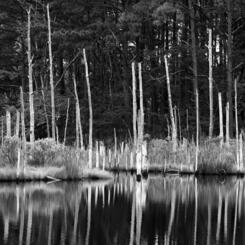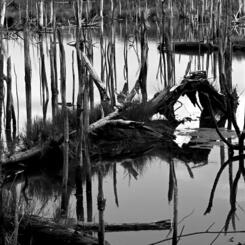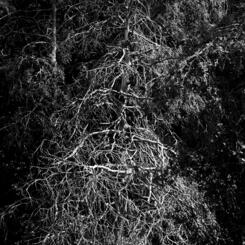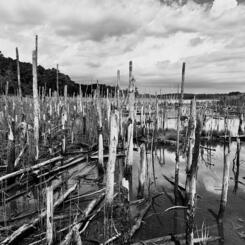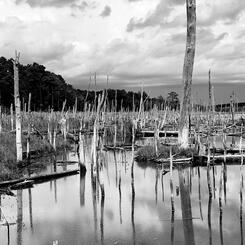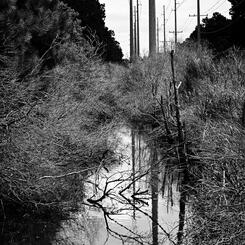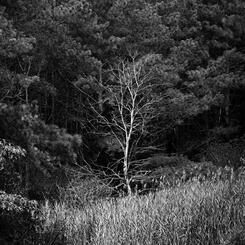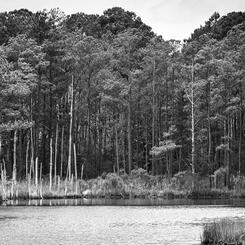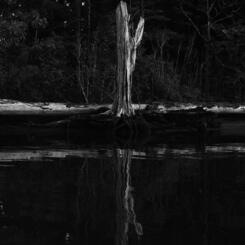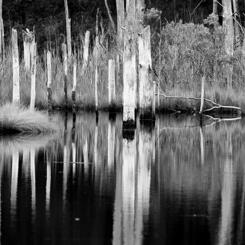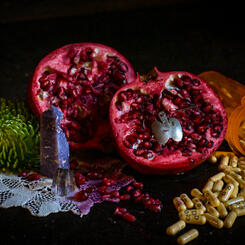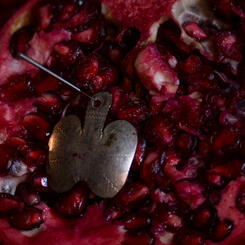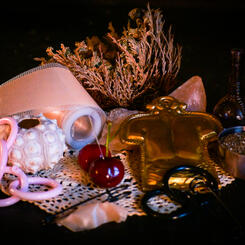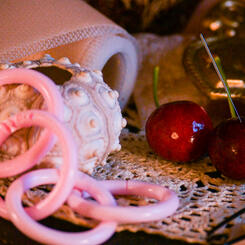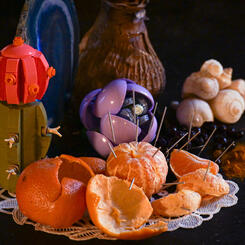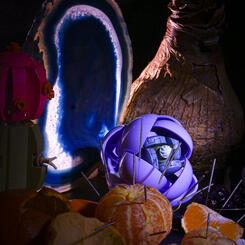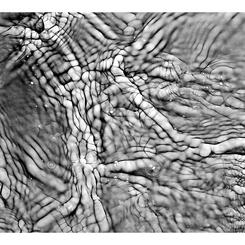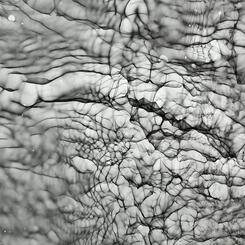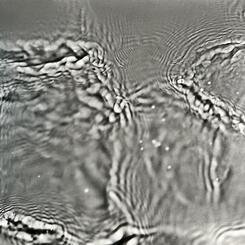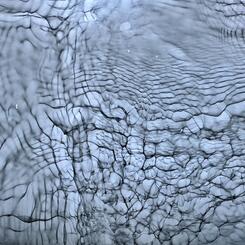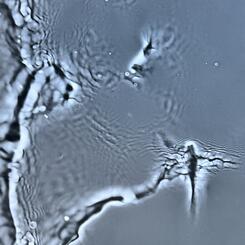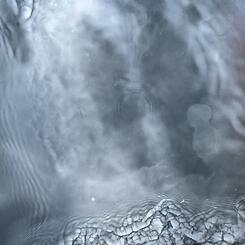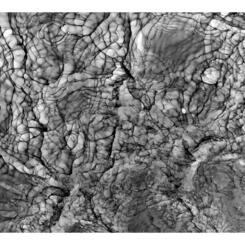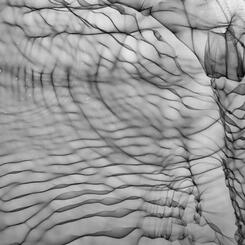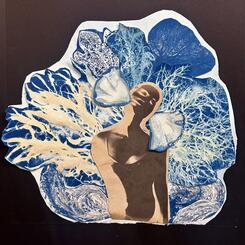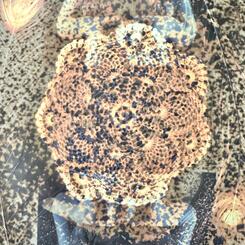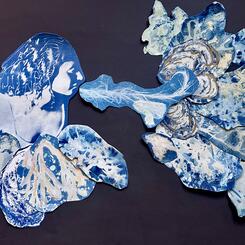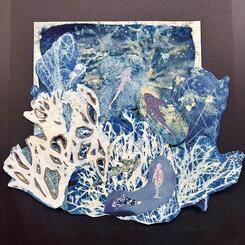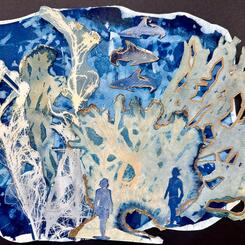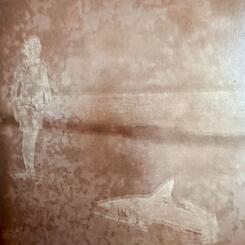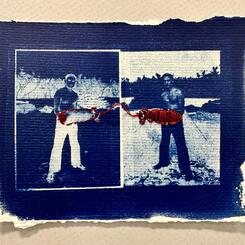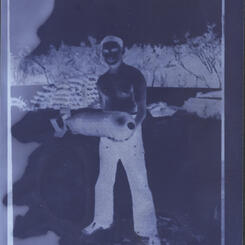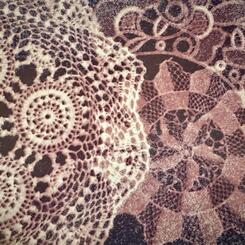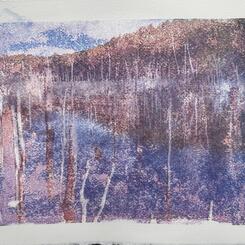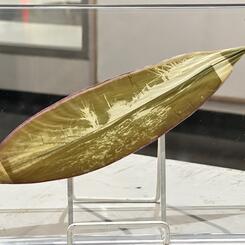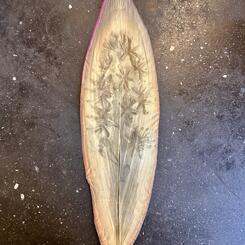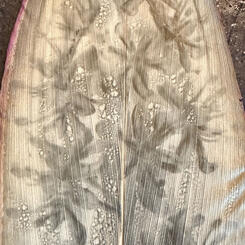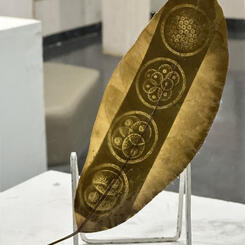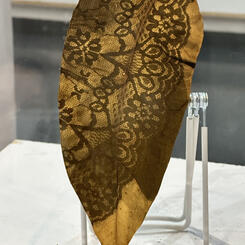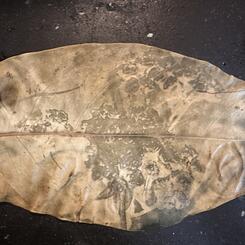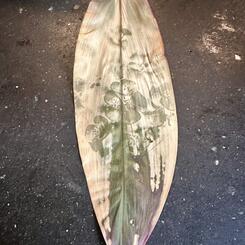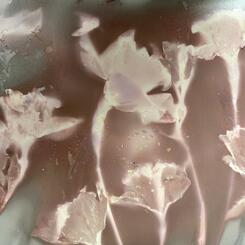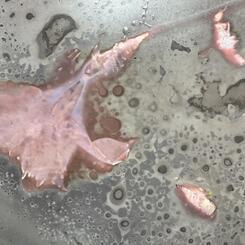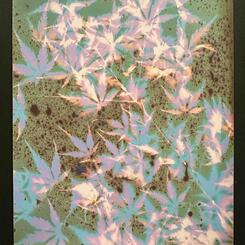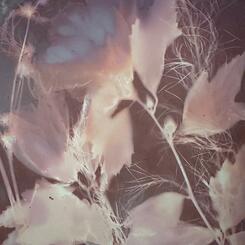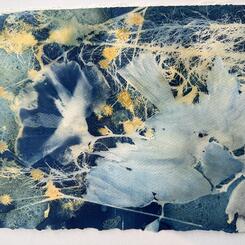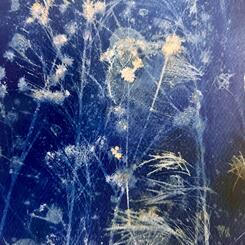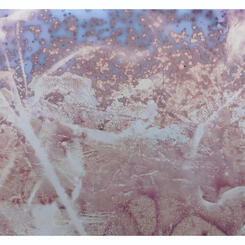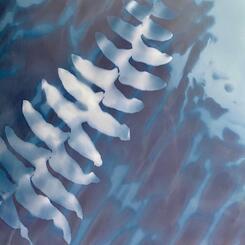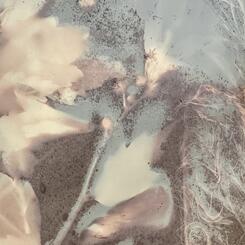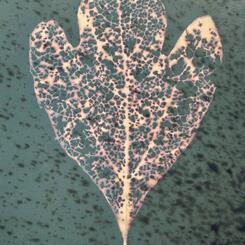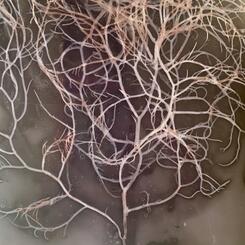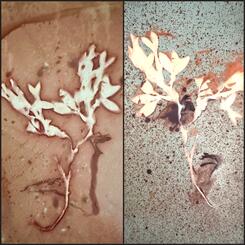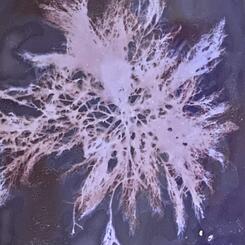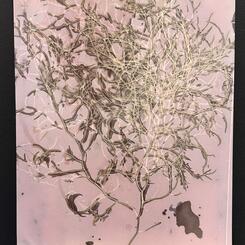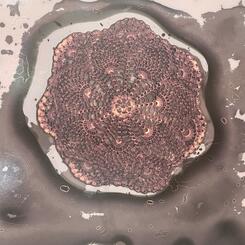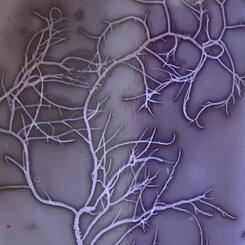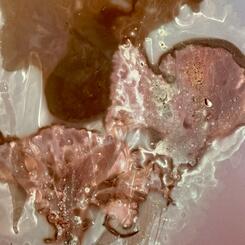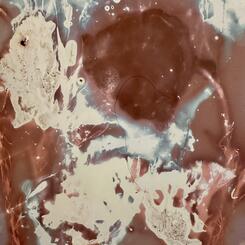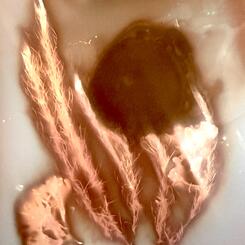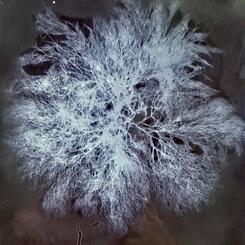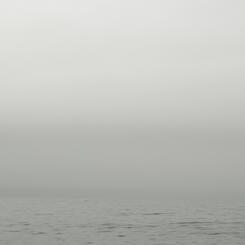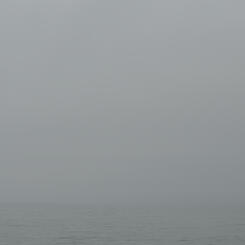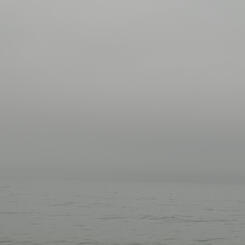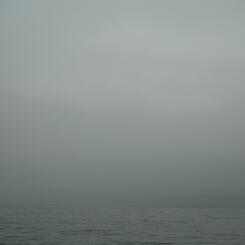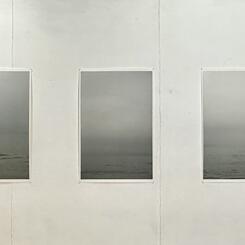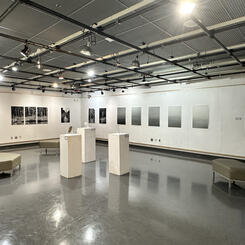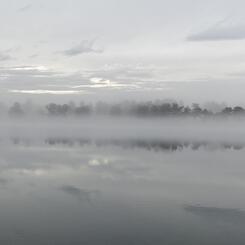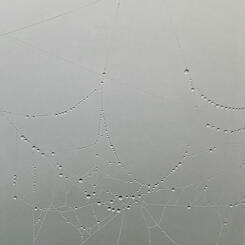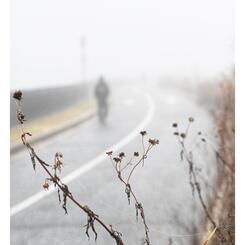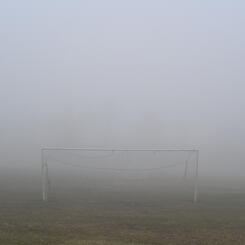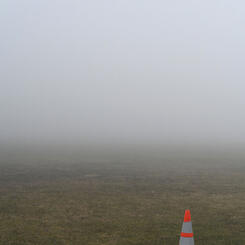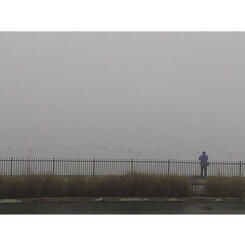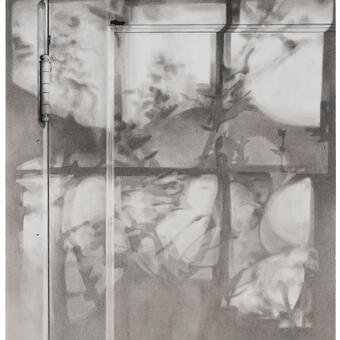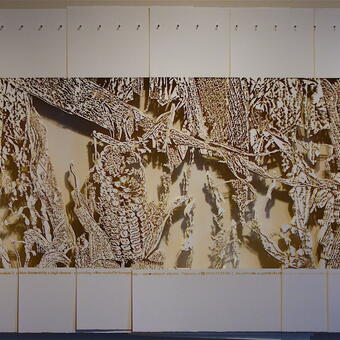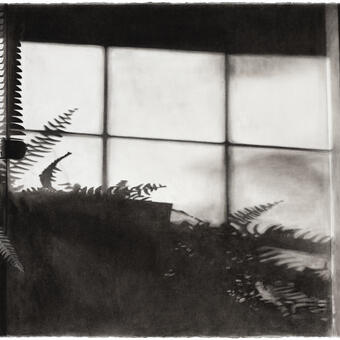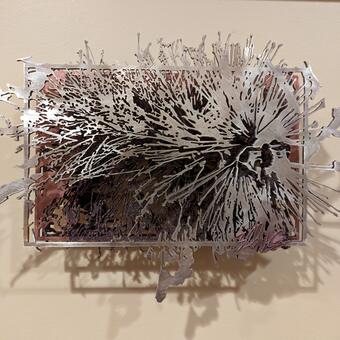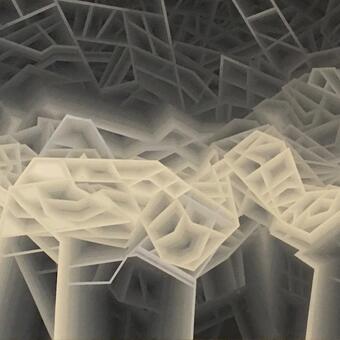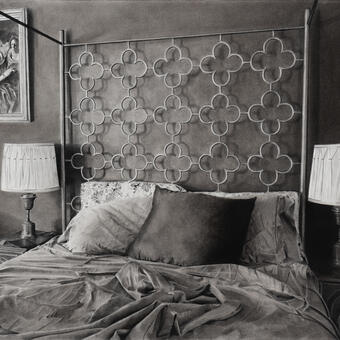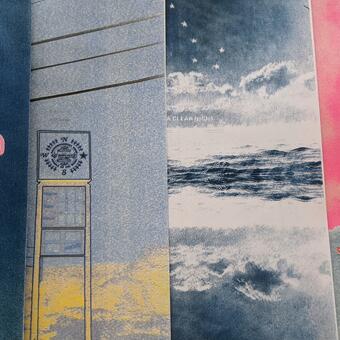Work samples
-
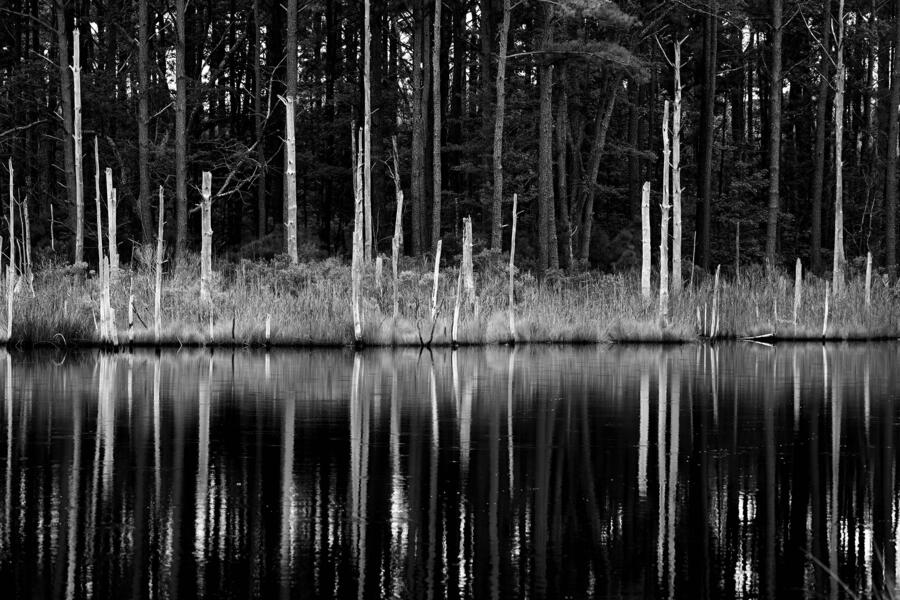 Ghost Forest no.5
Ghost Forest no.5Ghost Forest no. 5, digital photography 44" x 72" giclée print, 2025
The Ghost Forest series is an ongoing photographic documentation begun in the summer of 2022. Depicting the emergence of ghost forests along the mid-Atlantic coasts, particularly in the DelMarVa area. When salt water is pushed inland into freshwater ecosystems due to storms, rising sea level, and climate change, the salinity of the soil becomes too high. The Atlantic White Cedar is particularly susceptible to the high salinity, and is the first species to die. The skeletal white trunks standing against lush landscape are sounding the alarm of a changing climate. This stark contrast is both beautiful and disconcerting, creating visual and literal gaps in the density of the forest. In the Ghost Forest series, the image persists in its reproduction, while the subjects themselves are deteriorating into near disappearance.
Works from this series have been exhibited at Rehoboth Art League, Center for Inland Bays, Gallery Blue Door and Cotyledon Gallery.
-
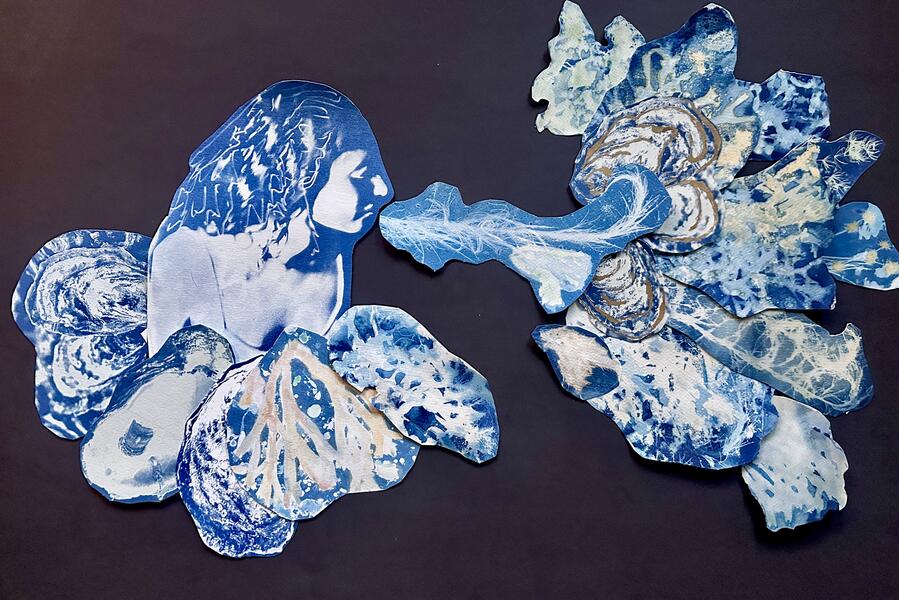 Salt Witch
Salt Witch”Salt Witch,” mixed media collage, appx. 20" x 30" 2025.
Cyanotype, Van Dyke Brown, water color, gold leaf on watercolor paper with found plants and objects, seaweed, salt water, vinegar, soap bubbles, and tumeric applied during exposure in sunlight. Cyanotypes are a historic alternative light sensitive process where the liquid cyanotype chemical is applied in layers to a surface. The image is created by laying objects, translucent images, or negatives to block or expose certain areas of the composition. The piece is exposed to UV light and developed in water. The additional colors in this piece were created by applying different herbs, soaps and salt water during the exposure process.
-
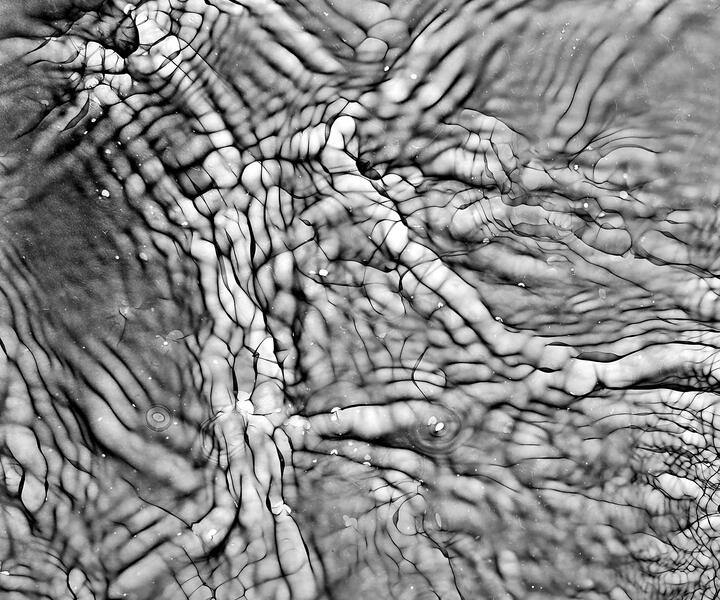 Insley_Sherry_Reverberate_2.jpg
Insley_Sherry_Reverberate_2.jpgReverberate, Watergram 20" x 24" giclée print, 2024
Reverberate is an experimentation in alternative processes in the darkroom. Film and camera-less, these images are created with only light, water and motion. The unique lines and patterns in the images appear as the water vibrates during exposure. Processed in traditional darkroom chemistry and one of a kind, these images are visual representations of sound. More current work incorporates original sound composed in collaboration with musician Mitch Maltese, a short video of this process and a sample of the sound is included in the project.
Works from this series have been exhibited at the Katz Gallery, Gallery Blue Door and The Peale.
-
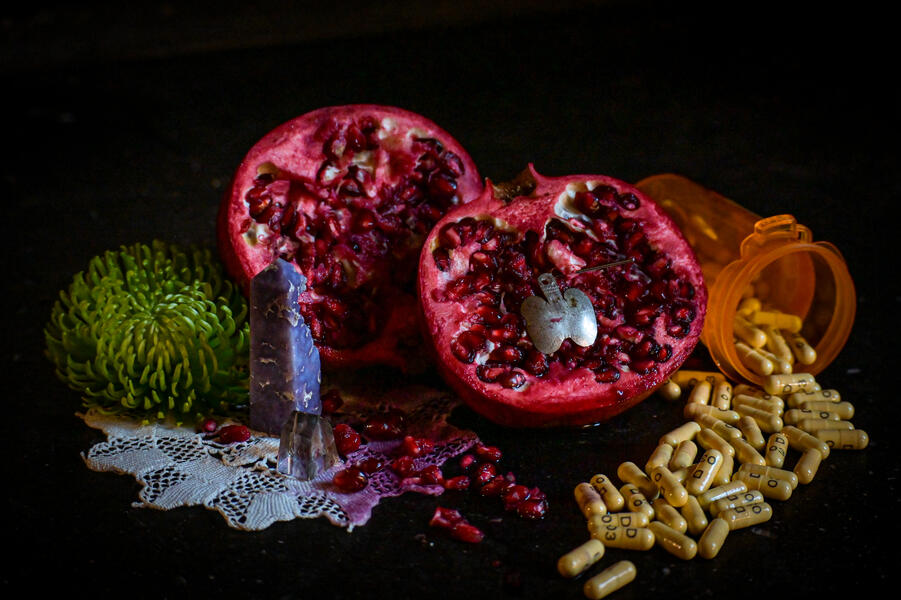 Invasive Lobular Carcinoma
Invasive Lobular CarcinomaInvasive Lobular Carcinoma, from the Vanitas series. Digital photography 20" x 24" giclée print, 2026
Vanitas, draws from allegorical Dutch still-life paintings to examine mortality, impermanence, and the vanity of earthly pleasures. Informed by a life-altering cancer diagnosis in the summer of 2025, this ongoing series reflects the realities of chronic illness. As medical appointments, procedures, and treatments disrupted my studio practice, I adapted by producing smaller-scale works at home. Traditional Vanitas symbolism is reimagined through the inclusion of personal objects such as acupuncture needles, medication, scar wrap, and surgical drain rings, connecting historical metaphor with my current experience.
About SHERRY
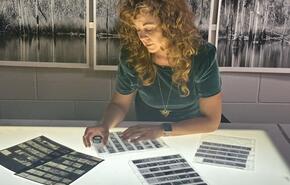
Sherry Insley is a Baltimore-based artist working primarily in photography and alternative light-sensitive processes. Her ongoing project Ghost Forest documents the visible effects of climate change along the Mid-Atlantic Coast. As rising sea levels and storm surges push saltwater into freshwater ecosystems, soil salinity increases, causing the Atlantic White Cedar—highly sensitive to salt—to be the first species to die. Their skeletal white trunks… more
Ghost Forest Series
The Ghost Forest series is an ongoing photographic documentation begun in the summer of 2022. Depicting the emergence of ghost forests along the mid-Atlantic coasts, particularly in the DelMarVa area. When salt water is pushed inland into freshwater ecosystems due to storms, rising sea level, and climate change, the salinity of the soil becomes too high. The Atlantic White Cedar is particularly susceptible to the high salinity, and is the first species to die. The skeletal white trunks standing against lush landscape are sounding the alarm of a changing climate. This stark contrast is both beautiful and disconcerting, creating visual and literal gaps in the density of the forest. In the Ghost Forest series, the image persists in its reproduction, while the subjects themselves are deteriorating into near disappearance.
Works from this series have been exhibited at Rehoboth Art League, Center for Inland Bays, Gallery Blue Door and Cotyledon Gallery.
-
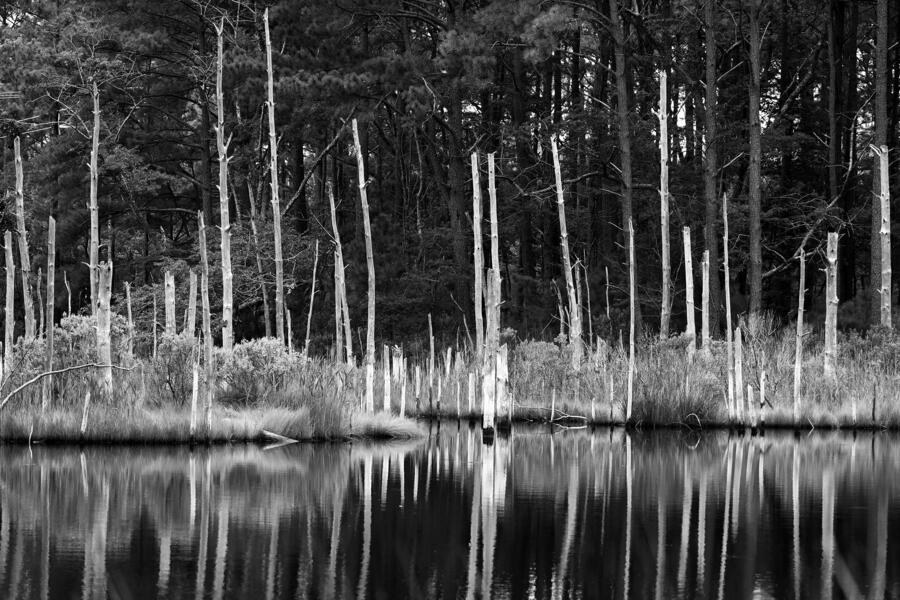 Ghost Forest Series
Ghost Forest SeriesGhost Forest Series, Digital Photography, 24" x 36" giclée print, 2024
The Ghost Forest series is an ongoing photographic documentation begun in the summer of 2022. Depicting the emergence of ghost forests along the mid-Atlantic coasts, particularly in the DelMarVa area. When salt water is pushed inland into freshwater ecosystems due to storms, rising sea level, and climate change, the salinity of the soil becomes too high. The Atlantic White Cedar is particularly susceptible to the high salinity, and is the first species to die. Large scale black and white digital photographic series.
-
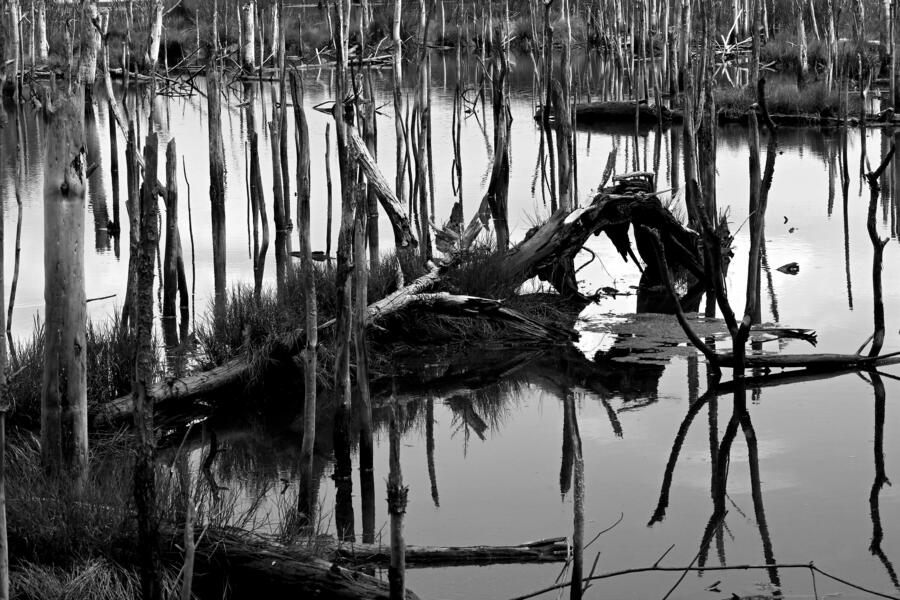 Ghost Forest Series
Ghost Forest SeriesGhost Forest Series, Digital Photography, 24" x 36" giclée print, 2023
The Ghost Forest series is an ongoing photographic documentation begun in the summer of 2022. Depicting the emergence of ghost forests along the mid-Atlantic coasts, particularly in the DelMarVa area. When salt water is pushed inland into freshwater ecosystems due to storms, rising sea level, and climate change, the salinity of the soil becomes too high. The Atlantic White Cedar is particularly susceptible to the high salinity, and is the first species to die. Large scale black and white digital photographic series.
-
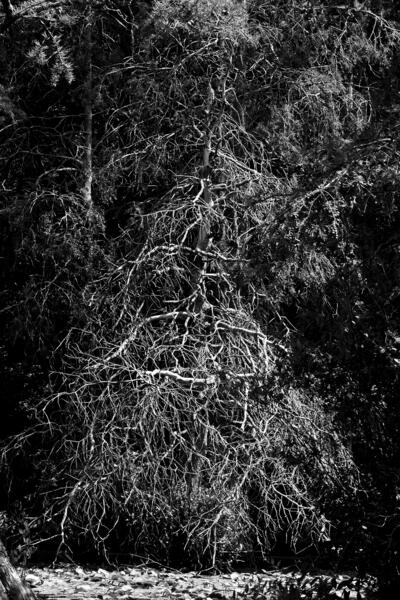 Ghost Forest Series
Ghost Forest SeriesGhost Forest Series, Digital Photography, 36" x 24" giclée print, 2023
The Ghost Forest series is an ongoing photographic documentation begun in the summer of 2022. Depicting the emergence of ghost forests along the mid-Atlantic coasts, particularly in the DelMarVa area. When salt water is pushed inland into freshwater ecosystems due to storms, rising sea level, and climate change, the salinity of the soil becomes too high. The Atlantic White Cedar is particularly susceptible to the high salinity, and is the first species to die. Large scale black and white digital photographic series.
-
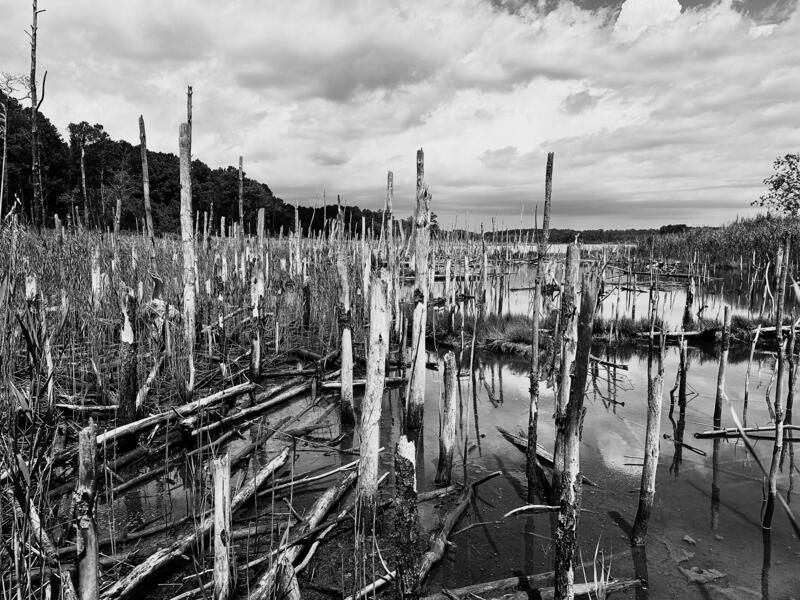 Ghost Forest Series
Ghost Forest SeriesGhost Forest Series, Digital Photography, 24" x 36" giclée print, 2024
The Ghost Forest series is an ongoing photographic documentation begun in the summer of 2022. Depicting the emergence of ghost forests along the mid-Atlantic coasts, particularly in the DelMarVa area. When salt water is pushed inland into freshwater ecosystems due to storms, rising sea level, and climate change, the salinity of the soil becomes too high. The Atlantic White Cedar is particularly susceptible to the high salinity, and is the first species to die. Large scale black and white digital photographic series.
-
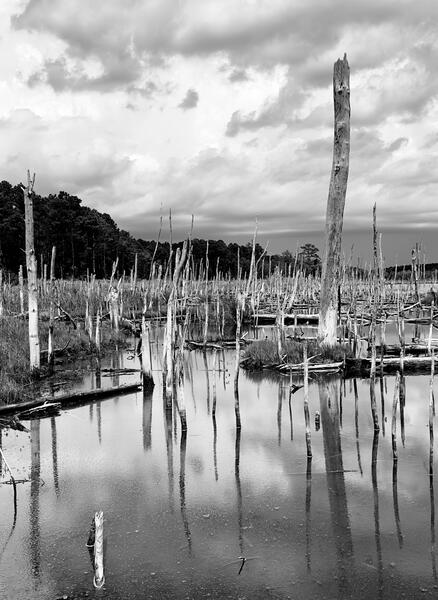 Ghost Forest Series
Ghost Forest SeriesGhost Forest Series, Digital Photography, 36" x 24" giclée print, 2023
The Ghost Forest series is an ongoing photographic documentation begun in the summer of 2022. Depicting the emergence of ghost forests along the mid-Atlantic coasts, particularly in the DelMarVa area. When salt water is pushed inland into freshwater ecosystems due to storms, rising sea level, and climate change, the salinity of the soil becomes too high. The Atlantic White Cedar is particularly susceptible to the high salinity, and is the first species to die. Large scale black and white digital photographic series.
-
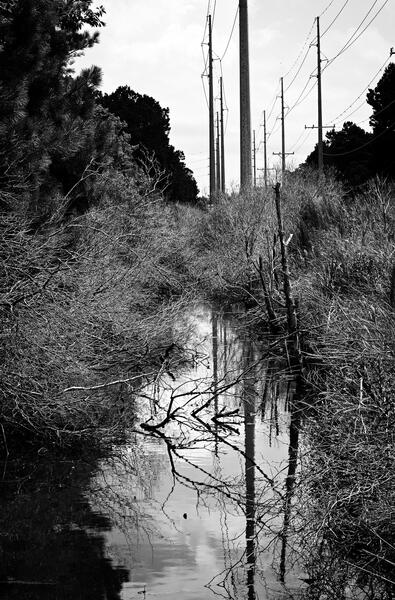 Ghost Forest
Ghost ForestGhost Forest Series, Digital Photography, 36" x 24" giclée print, 2022
The Ghost Forest series is an ongoing photographic documentation begun in the summer of 2022. Depicting the emergence of ghost forests along the mid-Atlantic coasts, particularly in the DelMarVa area. When salt water is pushed inland into freshwater ecosystems due to storms, rising sea level, and climate change, the salinity of the soil becomes too high. The Atlantic White Cedar is particularly susceptible to the high salinity, and is the first species to die. Large scale black and white digital photographic series.
-
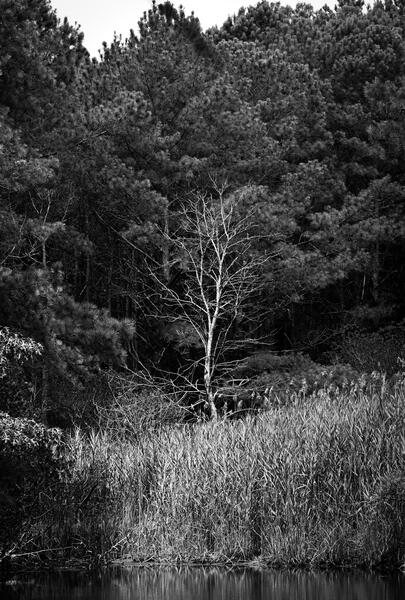 Ghost Forest
Ghost ForestGhost Forest Series, Digital Photography, 24" x 36" giclée print, 2022
The Ghost Forest series is an ongoing photographic documentation begun in the summer of 2022. Depicting the emergence of ghost forests along the mid-Atlantic coasts, particularly in the DelMarVa area. When salt water is pushed inland into freshwater ecosystems due to storms, rising sea level, and climate change, the salinity of the soil becomes too high. The Atlantic White Cedar is particularly susceptible to the high salinity, and is the first species to die. Large scale black and white digital photographic series.
-
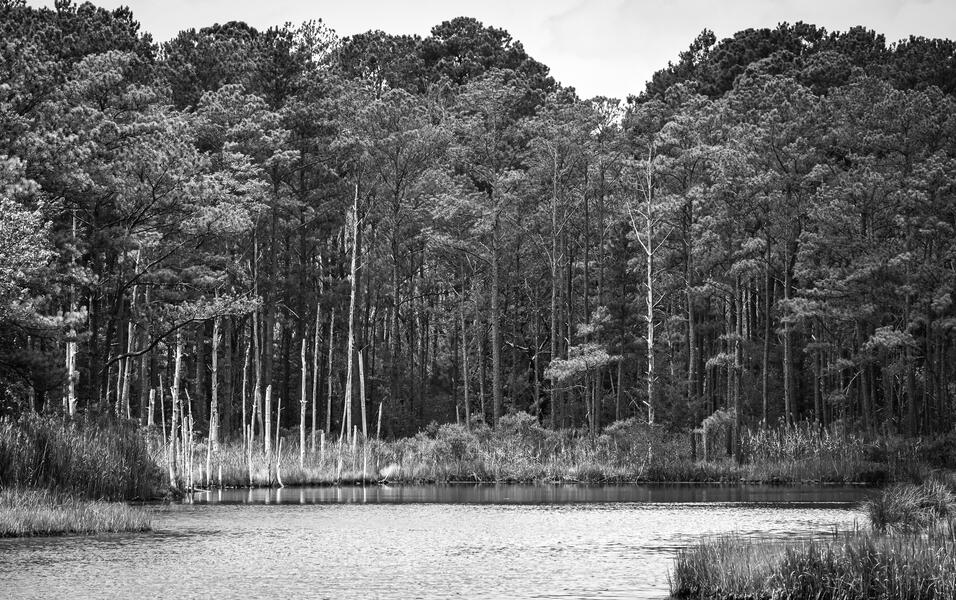 Ghost Forest
Ghost ForestGhost Forest Series, Digital Photography, 24" x 36" giclée print, 2022
The Ghost Forest series is an ongoing photographic documentation begun in the summer of 2022. Depicting the emergence of ghost forests along the mid-Atlantic coasts, particularly in the DelMarVa area. When salt water is pushed inland into freshwater ecosystems due to storms, rising sea level, and climate change, the salinity of the soil becomes too high. The Atlantic White Cedar is particularly susceptible to the high salinity, and is the first species to die. Large scale black and white digital photographic series.
-
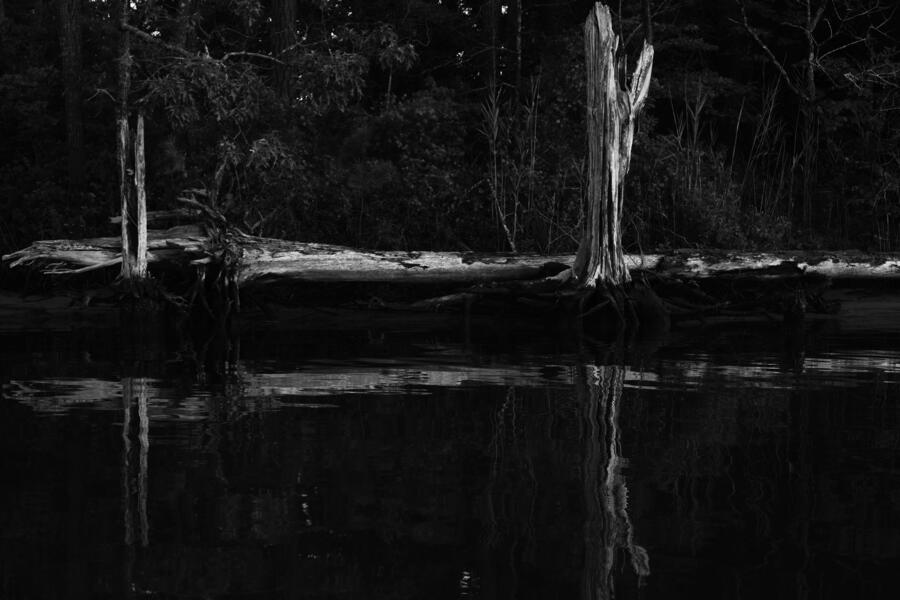 Ghost Forest Series
Ghost Forest SeriesGhost Forest Series, Digital Photography, 24" x 36" giclée print, 2024
The Ghost Forest series is an ongoing photographic documentation begun in the summer of 2022. Depicting the emergence of ghost forests along the mid-Atlantic coasts, particularly in the DelMarVa area. When salt water is pushed inland into freshwater ecosystems due to storms, rising sea level, and climate change, the salinity of the soil becomes too high. The Atlantic White Cedar is particularly susceptible to the high salinity, and is the first species to die. Large scale black and white digital photographic series.
-
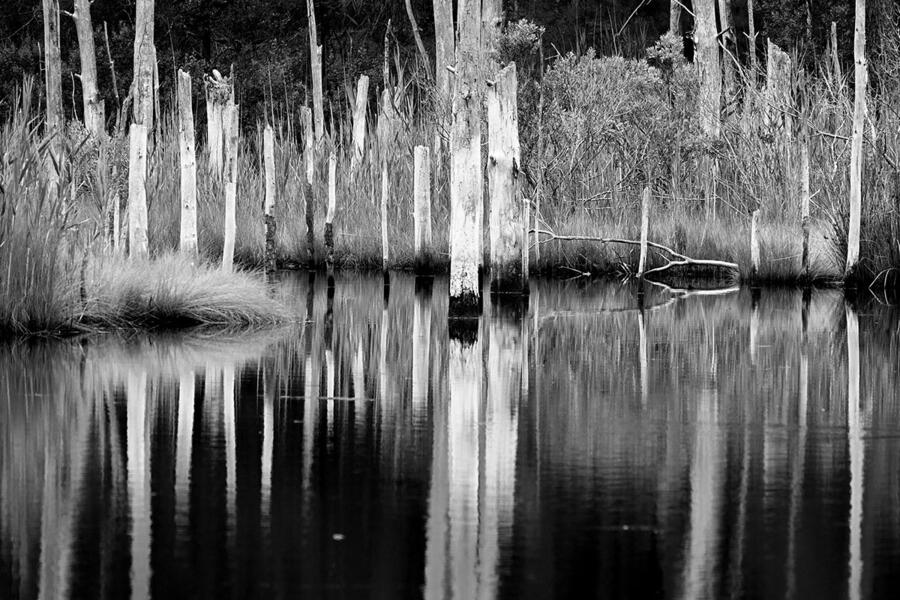 Ghost Forest Series
Ghost Forest SeriesGhost Forest Series, Digital Photography, 24" x 36" giclée print, 2023
The Ghost Forest series is an ongoing photographic documentation begun in the summer of 2022. Depicting the emergence of ghost forests along the mid-Atlantic coasts, particularly in the DelMarVa area. When salt water is pushed inland into freshwater ecosystems due to storms, rising sea level, and climate change, the salinity of the soil becomes too high. The Atlantic White Cedar is particularly susceptible to the high salinity, and is the first species to die. Large scale black and white digital photographic series.
Vanitas
Vanitas, draws from allegorical Dutch still-life paintings to examine mortality, impermanence, and the vanity of earthly pleasures. Informed by a life-altering cancer diagnosis in the summer of 2025, this ongoing series reflects the realities of chronic illness. As medical appointments, procedures, and treatments disrupted my studio practice, I adapted by producing smaller-scale works at home. Traditional Vanitas symbolism is reimagined through the inclusion of personal objects such as acupuncture needles, medication, scar wrap, and surgical drain rings, connecting historical metaphor with my current experience.
-
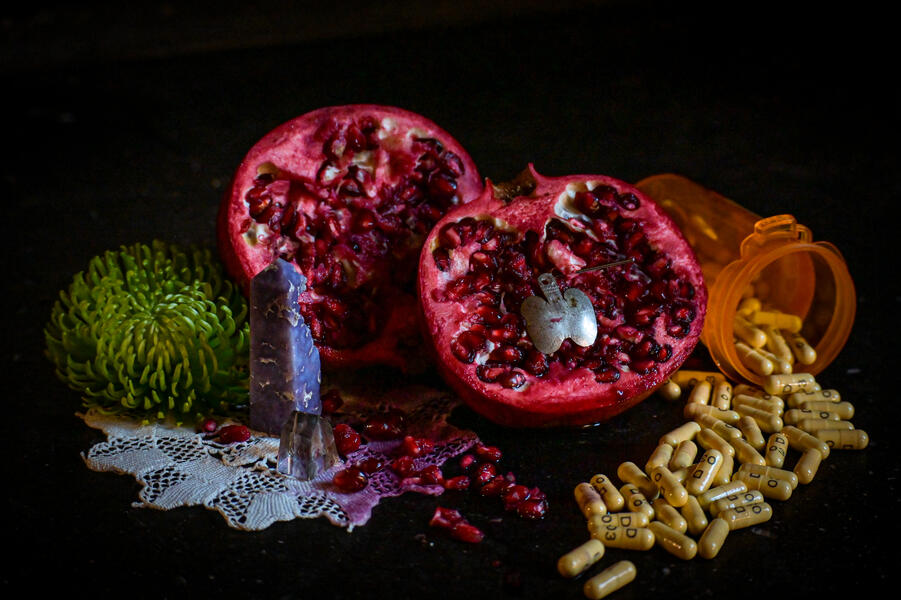 Invasive Lobular Carcinoma
Invasive Lobular CarcinomaInvasive Lobular Carcinoma, Digital Photography, Giclée Print, 20"x 24" 2025
Still life photography in the Vanitas painting style. Pomegranate, acupuncture needles, medication, milagros, lace, amethyst, chrysanthemum.
-
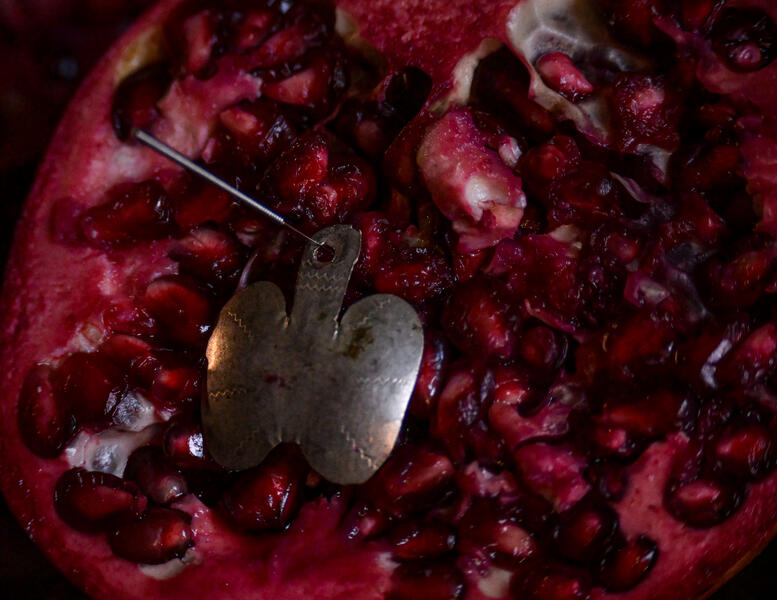 ILC Diagnosis 2025
ILC Diagnosis 2025ILC Diagnosis 2025, Digital Photography, Giclée Print, 20"x 24" 2025
Still life photography in the Vanitas painting style. Pomegranate, acupuncture needles, medication, milagros
-
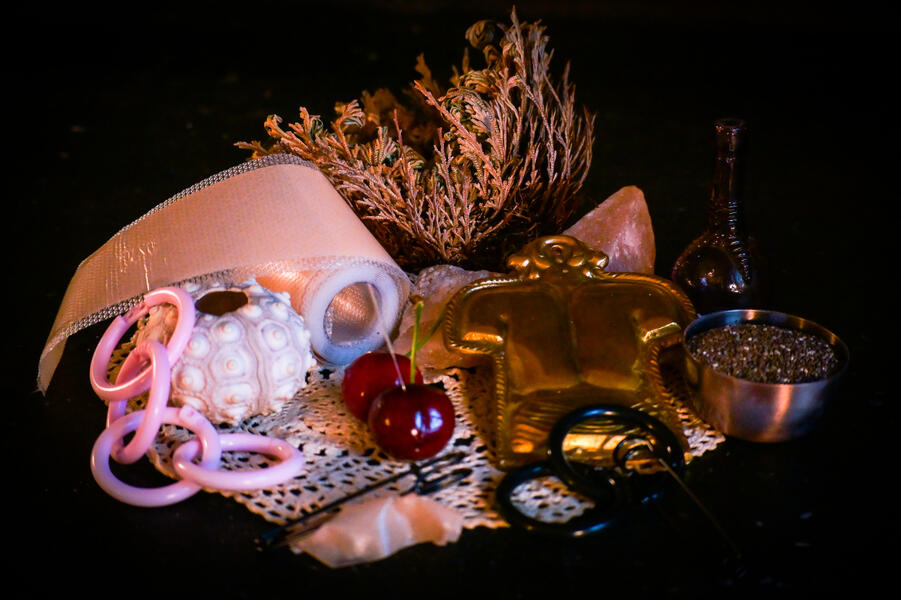 Diagnosis ER/PR +
Diagnosis ER/PR +Diagnosis ER/PR+, Digital Photography, Giclée Print, 20" x 24" 2026
Still life photography, cherries, flowers, scar tape, surgical bra rings, milagros, resurrection plant, shell, lace, acupuncture needles, chia seeds.
-
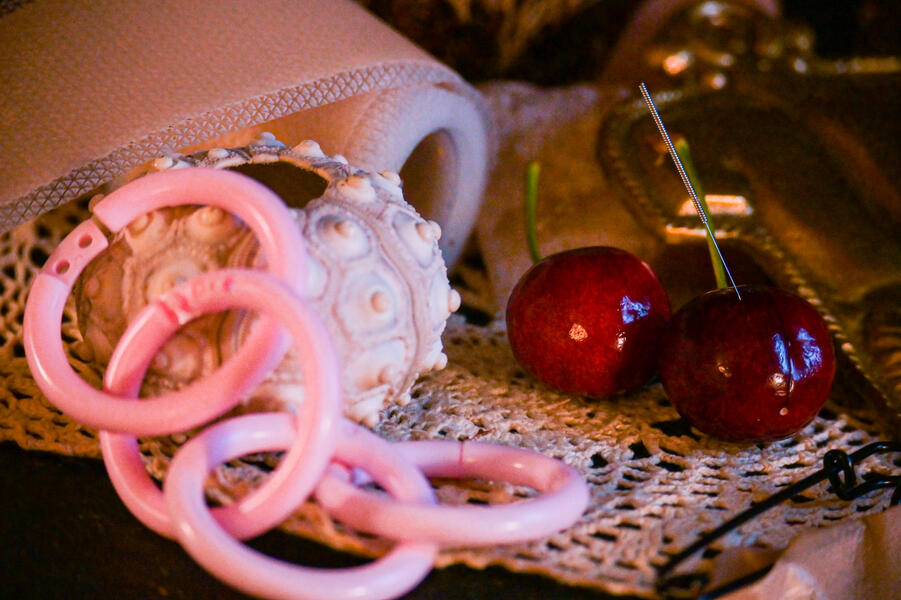 Diagnosis Her2-
Diagnosis Her2-Diagnosis Her2-, Digital Photography, Giclée Print, 20" x 24" 2026
Still life photography, cherries, flowers, scar tape, surgical bra rings, milagros, resurrection plant, shell, lace, acupuncture needles, chia seeds.
-
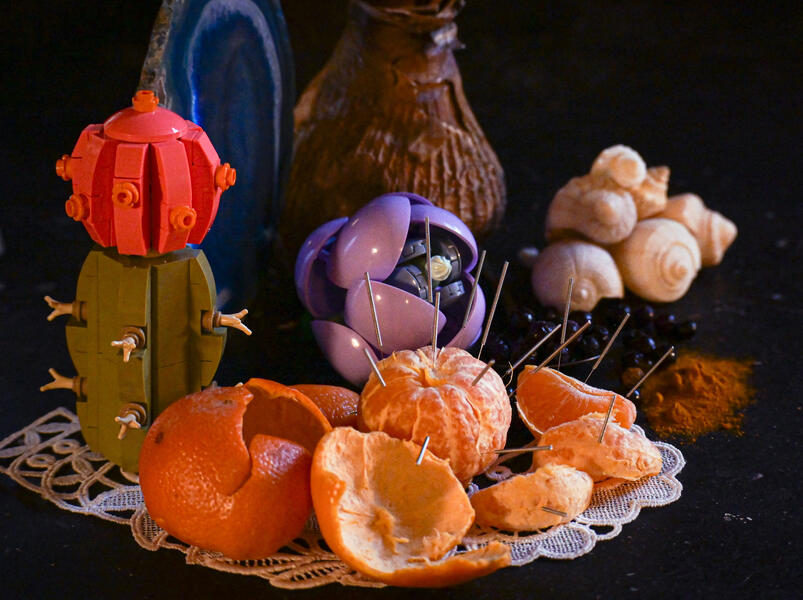 Oxidative Stress
Oxidative StressOxidative Stress, Digital Photography, Giclée Print, 20" x 24" 2026
Digital Still Life Photography, clementines, acupuncture needles, lego flowers, amaryllis bulb, blueberries, turmeric, seashells geode slice.
-
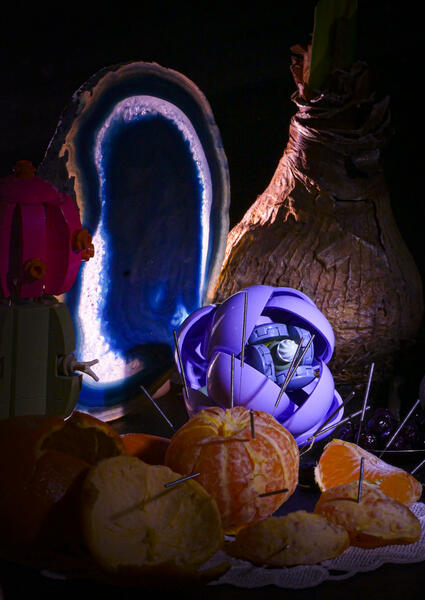 Antioxidants Are Recommended
Antioxidants Are RecommendedAntioxidants are Recommended, Digital Photography, Giclée Print, 24" x 20" 2026
Digital Still Life Photography, clementines, acupuncture needles, lego flowers, amaryllis bulb, blueberries, turmeric, seashells geode slice. Clementines, acupuncture needles, lego flowers, amaryllis bulb, blueberries, turmeric, seashells, geode slice.
Reverberate
Reverberate is an experimentation in alternative processes in the darkroom. Film and camera-less, these images are created with only light, water and motion. The unique lines and patterns in the images appear as the water vibrates during exposure. Processed in traditional darkroom chemistry and one of a kind, these images are visual representations of sound. More current work incorporates original sound composed in collaboration with musician Mitch Maltese, a short video of this process and a sample of the sound is included in the project.
Works from this series have been exhibited at the Katz Gallery, Gallery Blue Door and The Peale.
-
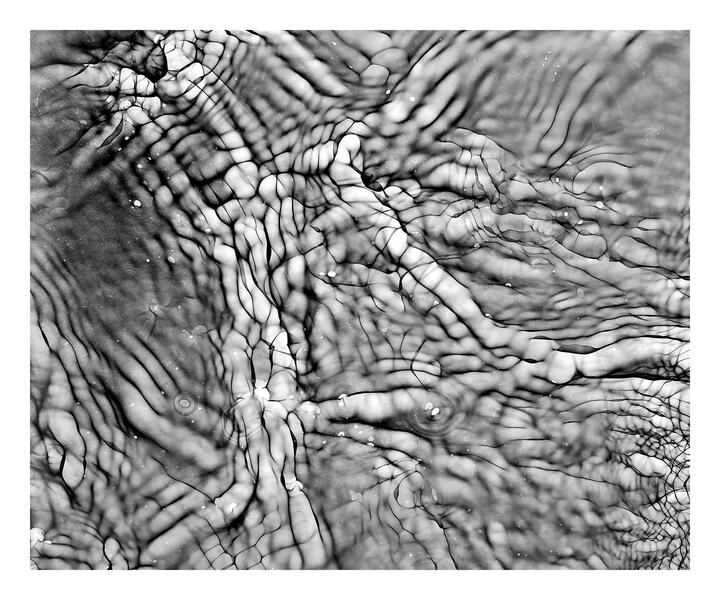 Reverberate Series
Reverberate SeriesFrom the Reverberate series, Watergram, 20" x24", 2023
Reverberate is an experimentation in alternative processes in the darkroom. Film and camera-less, these images are created with only light, water and motion. The unique lines and patterns in the images appear as the water vibrates during exposure. Processed in traditional darkroom chemistry and one of a kind, these images are visual representations of sound. More current work incorporates original sound composed in collaboration with musician Mitch Maltese.
-
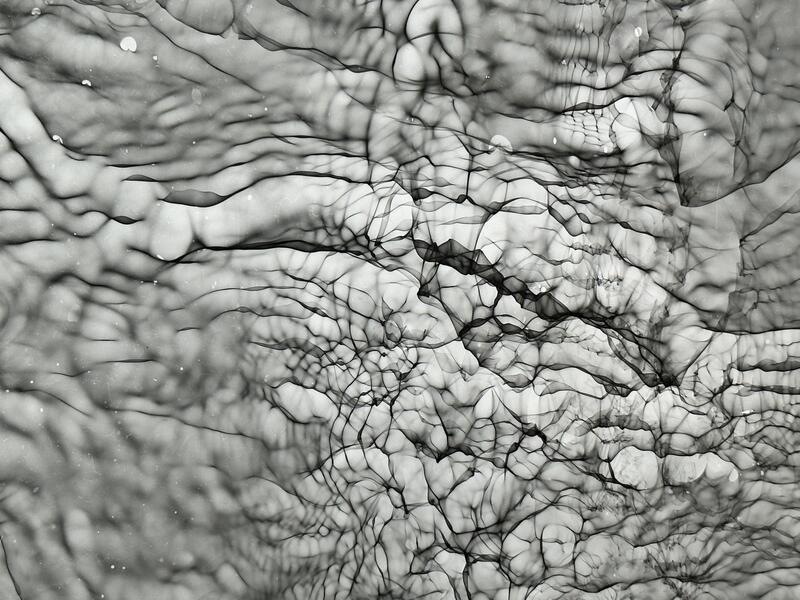 Reverberate Series
Reverberate SeriesFrom the Reverberate series, Watergram, 24" x20", 2023
Reverberate is an experimentation in alternative processes in the darkroom. Film and camera-less, these images are created with only light, water and motion. The unique lines and patterns in the images appear as the water vibrates during exposure. Processed in traditional darkroom chemistry and one of a kind, these images are visual representations of sound. More current work incorporates original sound composed in collaboration with musician Mitch Maltese.
-
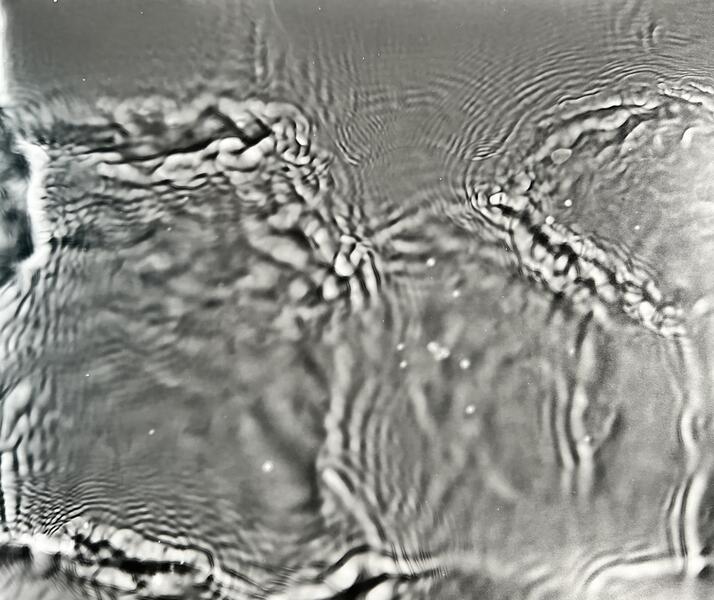 Reverberate Series
Reverberate SeriesFrom the Reverberate series, Watergram, 20" x24", 2023
Reverberate is an experimentation in alternative processes in the darkroom. Film and camera-less, these images are created with only light, water and motion. The unique lines and patterns in the images appear as the water vibrates during exposure. Processed in traditional darkroom chemistry and one of a kind, these images are visual representations of sound. More current work incorporates original sound composed in collaboration with musician Mitch Maltese.
-
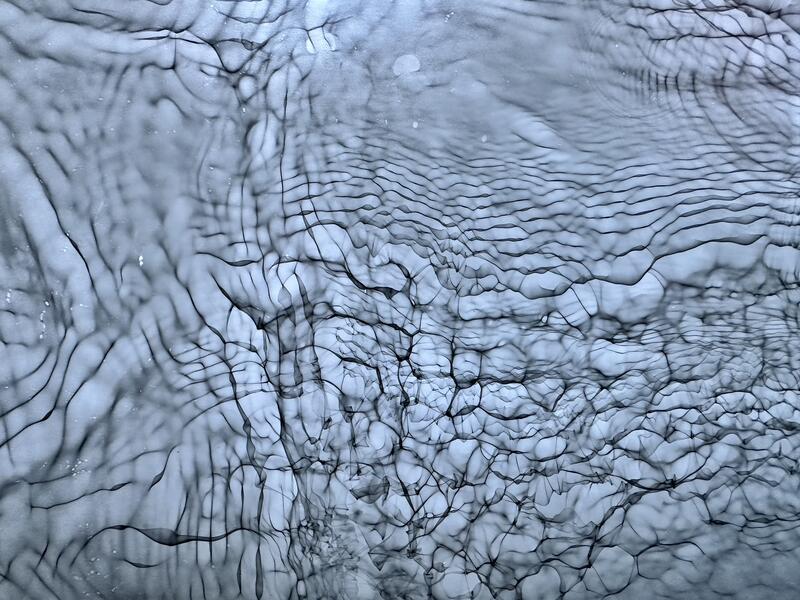 Reverberate Series
Reverberate SeriesFrom the Reverberate series, Watergram, 20" x24", 2023
Reverberate is an experimentation in alternative processes in the darkroom. Film and camera-less, these images are created with only light, water and motion. The unique lines and patterns in the images appear as the water vibrates during exposure. Processed in traditional darkroom chemistry and one of a kind, these images are visual representations of sound. More current work incorporates original sound composed in collaboration with musician Mitch Maltese.
-
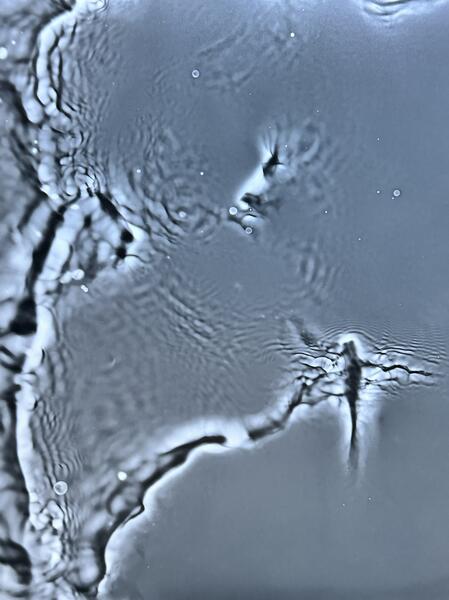 Reverberate Series
Reverberate SeriesFrom the Reverberate series, Watergram, 24" x20", 2023
Reverberate is an experimentation in alternative processes in the darkroom. Film and camera-less, these images are created with only light, water and motion. The unique lines and patterns in the images appear as the water vibrates during exposure. Processed in traditional darkroom chemistry and one of a kind, these images are visual representations of sound. More current work incorporates original sound composed in collaboration with musician Mitch Maltese.
-
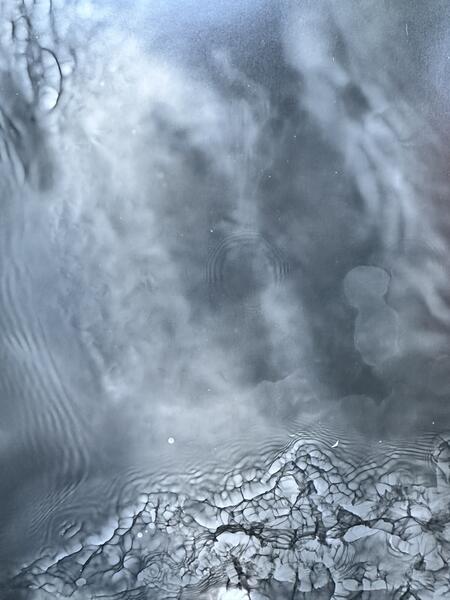 Reverberate Series
Reverberate SeriesFrom the Reverberate series, Watergram, 24" x20", 2023
Reverberate is an experimentation in alternative processes in the darkroom. Film and camera-less, these images are created with only light, water and motion. The unique lines and patterns in the images appear as the water vibrates during exposure. Processed in traditional darkroom chemistry and one of a kind, these images are visual representations of sound. More current work incorporates original sound composed in collaboration with musician Mitch Maltese.
-
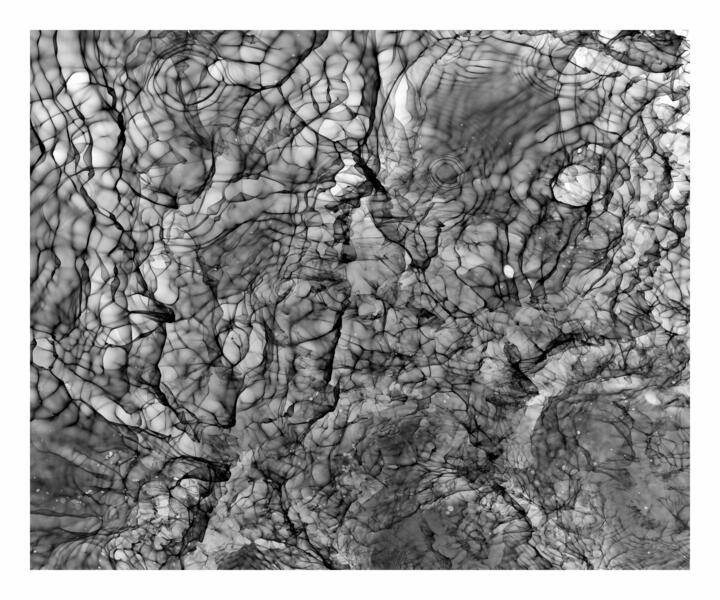 Reverberate Series
Reverberate SeriesReverberate series, Watergram, 20" x 24," 2024
Reverberate is an experimentation in alternative processes in the darkroom. Film and camera-less, these images are created with only light, water and motion. The unique lines and patterns in the images appear as the water vibrates during exposure. Processed in traditional darkroom chemistry and one of a kind, these images are visual representations of sound. More current work incorporates original sound composed in collaboration with musician Mitch Maltese
-
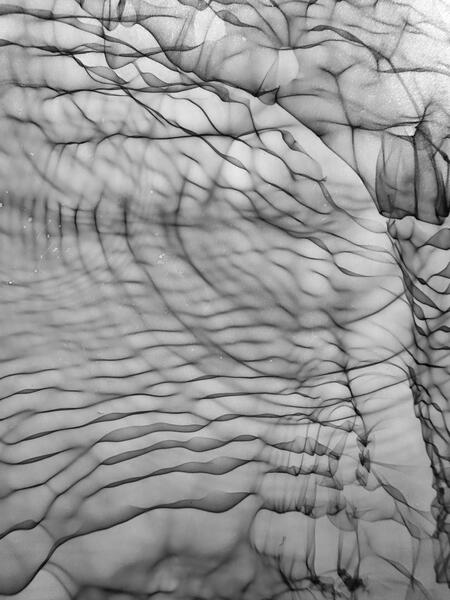 Reverberate Series
Reverberate SeriesFrom the Reverberate series, Watergram, 24" x20", 2024
Reverberate is an experimentation in alternative processes in the darkroom. Film and camera-less, these images are created with only light, water and motion. The unique lines and patterns in the images appear as the water vibrates during exposure. Processed in traditional darkroom chemistry and one of a kind, these images are visual representations of sound. More current work incorporates original sound composed in collaboration with musician Mitch Maltese.
-
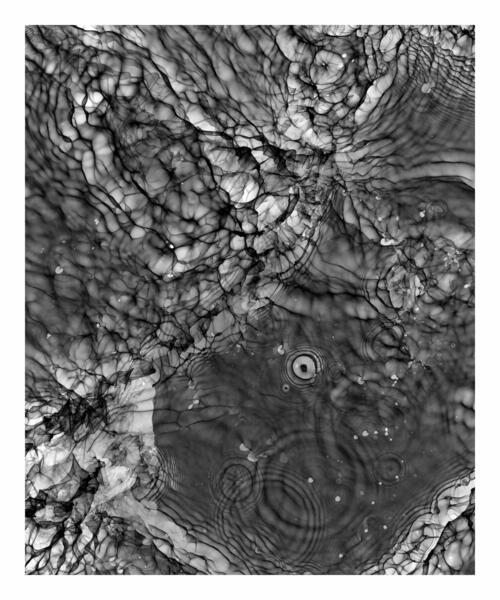 Reverberate Series
Reverberate SeriesFrom the Reverberate series, Watergram, 20" x24", 2024
Reverberate is an experimentation in alternative processes in the darkroom. Film and camera-less, these images are created with only light, water and motion. The unique lines and patterns in the images appear as the water vibrates during exposure. Processed in traditional darkroom chemistry and one of a kind, these images are visual representations of sound. More current work incorporates original sound composed in collaboration with musician Mitch Maltese.
-
Video clip of exposing a watergram in the darkroom
Video of the process of creating a watergram in the darkroom. This is an alternative photography process that does not utilize a camera, film or any digital tools. The image is created by capturing the patterns and shadows of light interacting with motion in water. Here I have placed a light sensitive sheet of photo paper in a tray of water with a small speaker in a metal cylinder. I am playing a clip of music composed by musician Mitch Maltese, which creates ripples and vibrations in the water. I then create a bright and fast flash from a calculated height and distance. This "stops" the motion of the water and records the shadows of the waves on to the photo paper. Then the print is processed in traditional photo chemistry. No two images are ever the same.
Time is an Unreliable Narrator
Through alternative processes such as lumen printing, photograms, cyanotypes, anthotypes, and image transfers, I am working with the physicality of photography. What does it mean to use a tool that documents and preserves, to create images that intentionally disappear? Conversely, if the photograph lasts longer than the subject, is it that image that is committed to memory rather than the subject itself? Can reflections and experiences become fabrications or by products of photography? Utilizing family photographs and found objects these photographic images serve as witness and documents of record, as well as manipulate and influence time. Lumen printing is a camera-less and chemical free image making process with traditional black and white darkroom paper. Objects or layers of negatives and transparencies are used to create the composition, and the changes in color occur from the age of the expired papers, the exposure length and the the temperature.
-
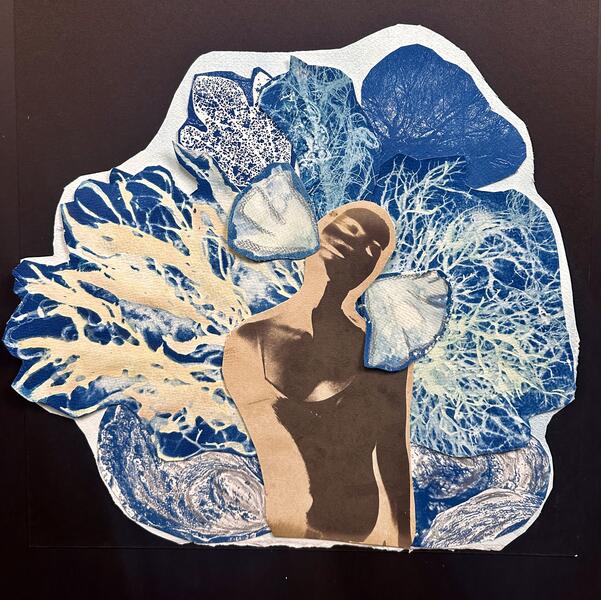 Ectoplasm
EctoplasmEctoplasm, Mixed Media Collage appx. 16" x 20", 2025
Mixed media cyanotype and Van Dyke Brown on watercolor paper with found plants and objects, seaweed, salt water, vinegar, soap bubbles, and tumeric applied during exposure in sunlight. Cyanotypes are a historic alternative light sensitive process where the liquid cyanotype chemical is applied in layers to a surface. The image is created by laying objects, translucent images, or negatives to block or expose certain areas of the composition. The piece is exposed to UV light and developed in water. The additional colors in this piece were created by applying different herbs, soaps and salt water during the exposure process. appx. 16" x 20", 2025
-
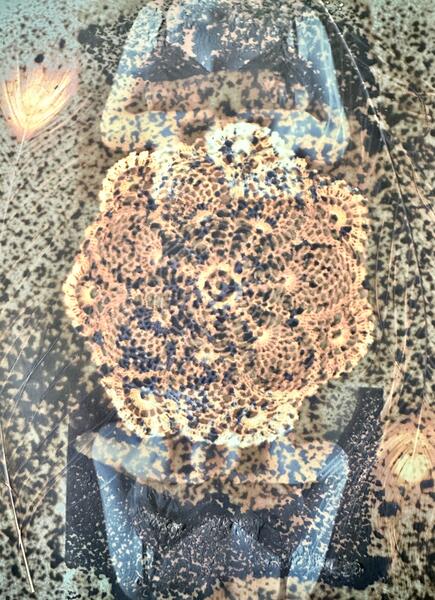 Time is an Unreliable Narrator
Time is an Unreliable NarratorTime is an Unreliable Narrator, Lumen Print 8" x 10", 2023
Lumen print of 4x5 negatives, handmade lace, and feathers, contact printed on expired black and white Agfa paper. Lumen printing is a camera-less and chemical free image making process with traditional black and white darkroom paper. Objects or layers of negatives and transparencies are used to create the composition, and the changes in color occur from the age of the expired papers, the exposure length, and the the temperature. This process requires the image to be unfixed, so it continues to develop and change color in ambient light. 8" x 10", 2023
-
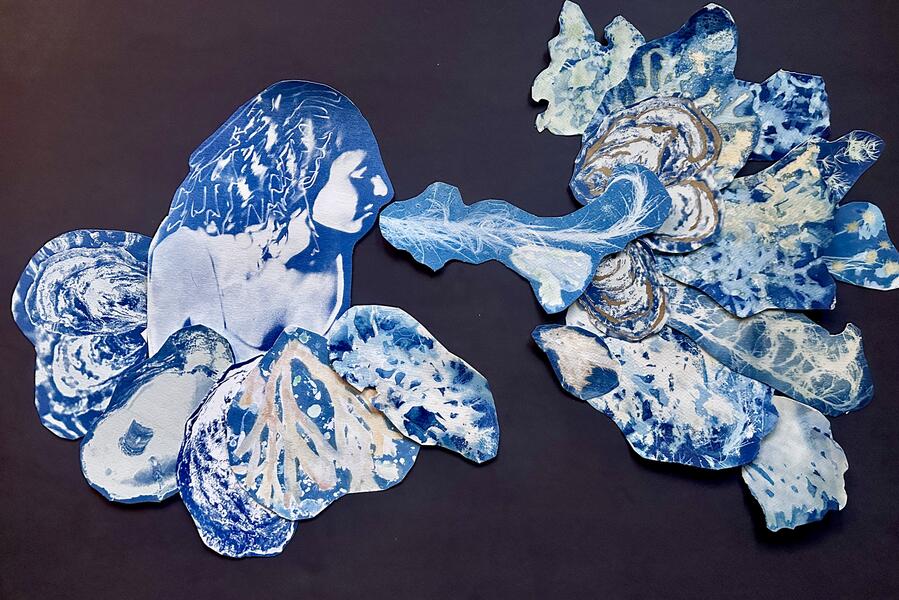 Salt Witch
Salt Witch"Salt Witch", Mixed Media Collage 20" x 30" 2025
Mixed media cyanotype and lumen prints on watercolor paper with found plants and objects, seaweed, salt water, vinegar, soap bubbles, and tumeric applied during exposure in sunlight. Cyanotypes are a historic alternative light sensitive process where the liquid cyanotype chemical is applied in layers to a surface. The image is created by laying objects, translucent images, or negatives to block or expose certain areas of the composition. The piece is exposed to UV light and developed in water. The additional colors in this piece were created by applying different herbs, soaps and salt water during the exposure process.
-
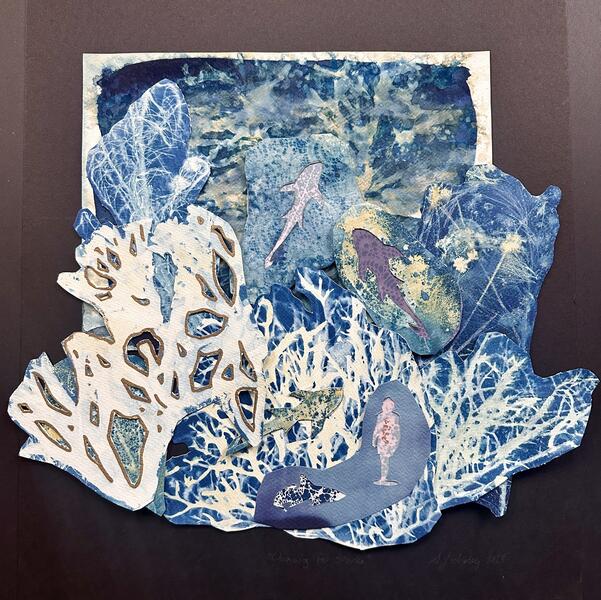 Chumming for Sharks
Chumming for Sharks"Chumming for Sharks" Mixed Media Collage, appx. 20" x 16," 2025.
mixed media cyanotype and lumen prints on watercolor paper with found plants and objects, seaweed, salt water, vinegar, soap bubbles, and tumeric applied during exposure in sunlight. Cyanotypes are a historic alternative light sensitive process where the liquid cyanotype chemical is applied in layers to a surface. The image is created by laying objects, translucent images, or negatives to block or expose certain areas of the composition. The piece is exposed to UV light and developed in water. The additional colors in this piece were created by applying different herbs, soaps and salt water during the exposure process.
-
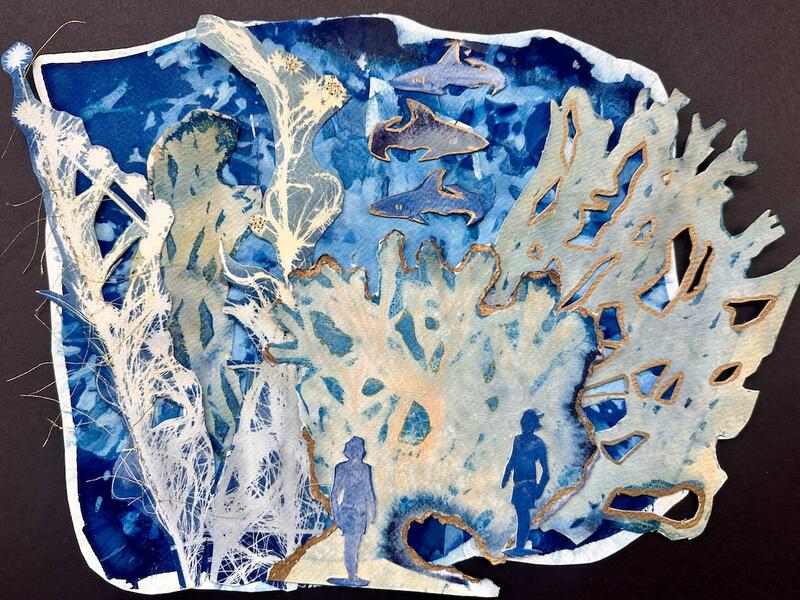 Shark Infested Waters
Shark Infested WatersShark Infested Waters, Mixed Media Collage, appx. 11" x 14" 2023
Cyanotype with mixed media collage on water color paper. Images from family archive, plant material, cyanotype chemistry, salt water, seaweed, soap, vinegar, turmeric, salt, gold thread, and sun light.
-
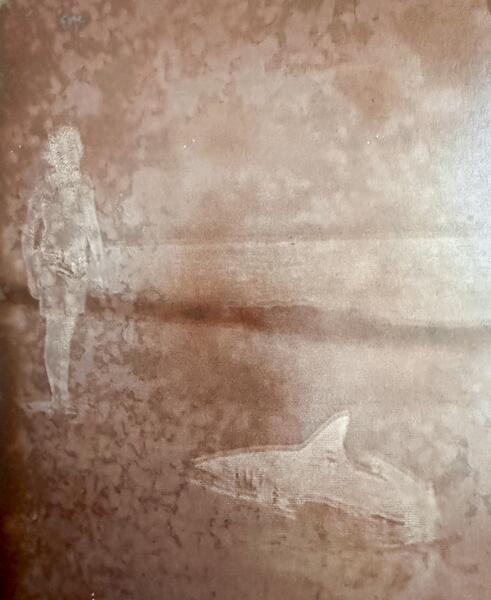 Shark Bait
Shark Bait"Shark Bait" Lumen Print, appx. 8" x 10" 2022
Lumen print on expired black and white photo paper. Utilized photos from family archive to create a digital negative for contact printing. appx. 8" x 10" 2022
-
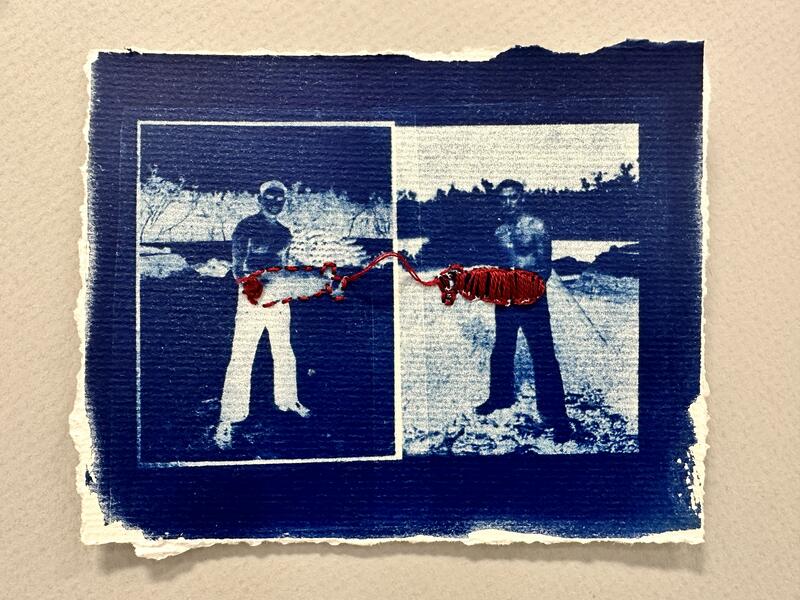 Time Bomb
Time BombTime Bomb, Cyanotype Collage, appx. 10" x 8" 2022
Cyanotype on watercolor paper with hand embroidery. Utilized family archive images to create a digital negative for contact printing.
-
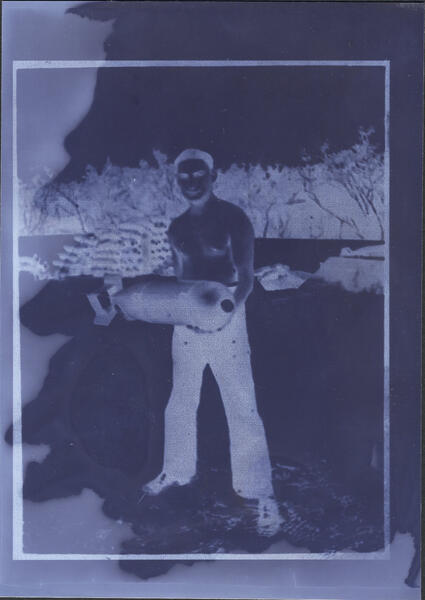 Time Bomb no. 2
Time Bomb no. 2Time Bomb no. 2, Lumen Print, appx. 5" x7" 2022
Lumen print on black and white photographic paper. Utilized family archive image to create a digital negative for contact printing.
-
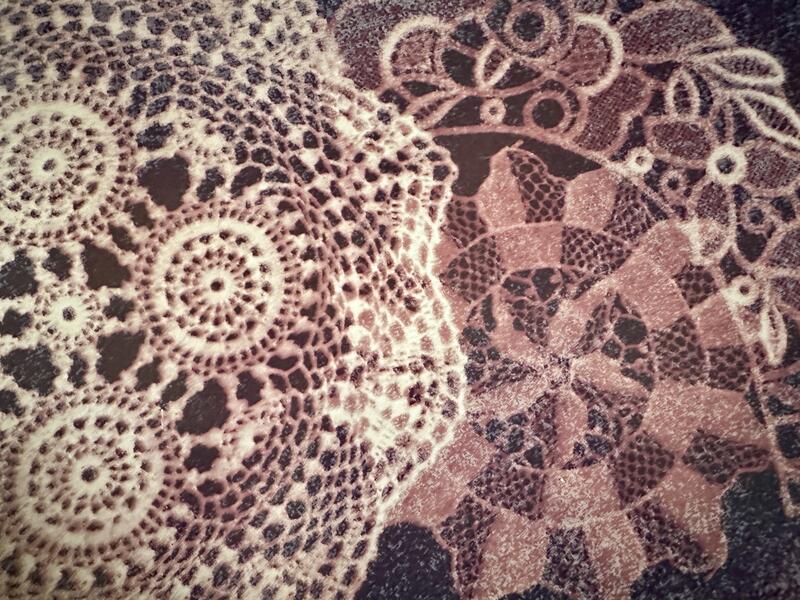 Petunia's Lace
Petunia's LacePetunia's Lace, Lumen Print, appx. 8" x 10", 2024
Lumen print with my Grandmother's heirloom lace, contact printed on expired black and white Agfa paper. Lumen printing is a camera-less and chemical free image making process with traditional black and white darkroom paper. Objects or layers of negatives and transparencies are used to create the composition, and the changes in color occur from the age of the expired papers, the exposure length, and the the temperature. This process requires the image to be unfixed, so it continues to develop and change color in ambient light. 8" x 10", 2024
-
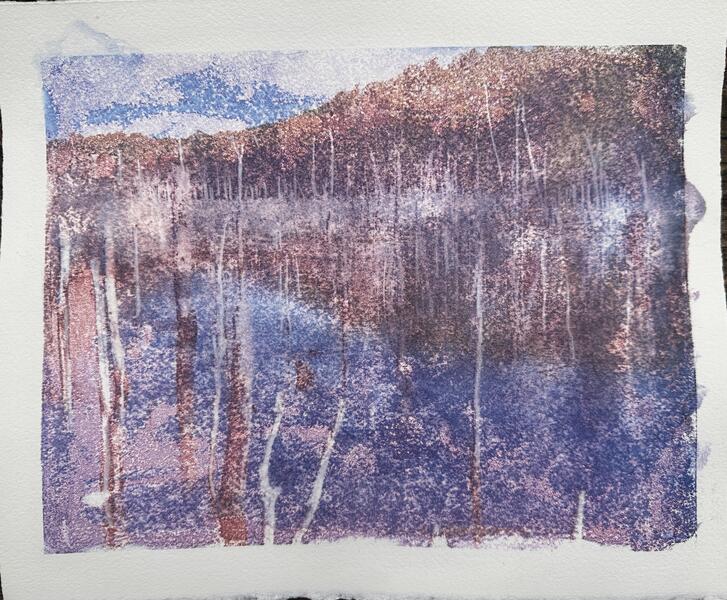 Fresh Pond
Fresh Pond"Fresh Pond" Image Transfer, 11" x14" 2024.
Color inkjet image transfer on watercolor paper, with hand coloring. 11" x 14" created in 2024.
Photo Synthesis
Chlorophyll printing is an alternative photographic process using plant materials, family photographs, found objects, digitally created negatives, and sun light. Exploring the ephemeral nature of memory. More current pieces utilize images of threatened or extinct native MD plant species juxtaposed and printed on popular plants found at garden centers across the country. This a camera-less, film-less and chemical free process using the light sensitivity in plant chlorophyll. These images are not archival and will continue to develop naturally in U.V. light.
Works from this series have been exhibited at the Katz Gallery, Cotyledon Gallery and Carver Center Gallery.
-
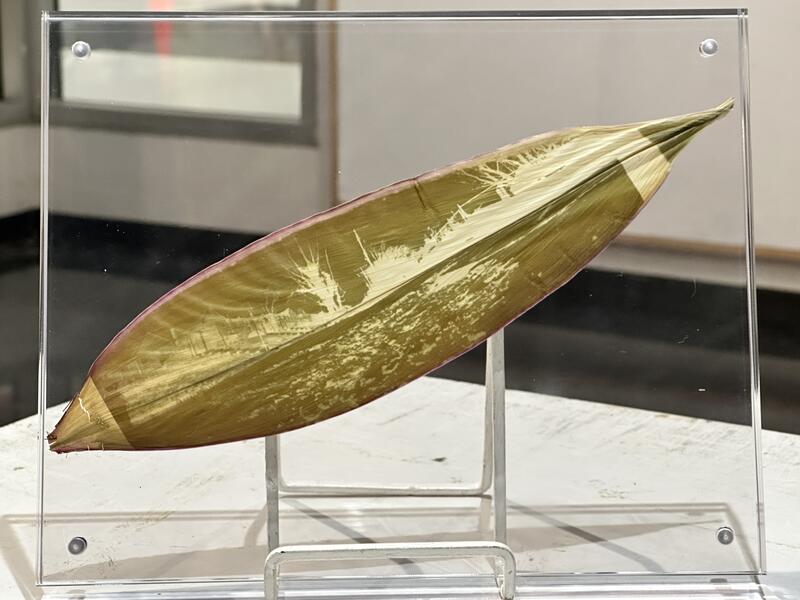 Alleyway
AlleywayAlleyway, Chlorophyll Print, appx. 8" x 10" 2023
Plant material, UV light, Pinhole negative and contact printing. Chlorophyll printing is an alternative photographic process using plant materials, family photographs, found objects, digitally created negatives, and sun light. Exploring the ephemeral nature of memory. More current pieces utilize images of threatened or extinct native MD plant species juxtaposed and printed on popular plants found at garden centers across the country. This a camera-less, film-less and chemical free process using the light sensitivity in plant chlorophyll. These images are not archival and will continue to develop naturally in U.V. light.
-
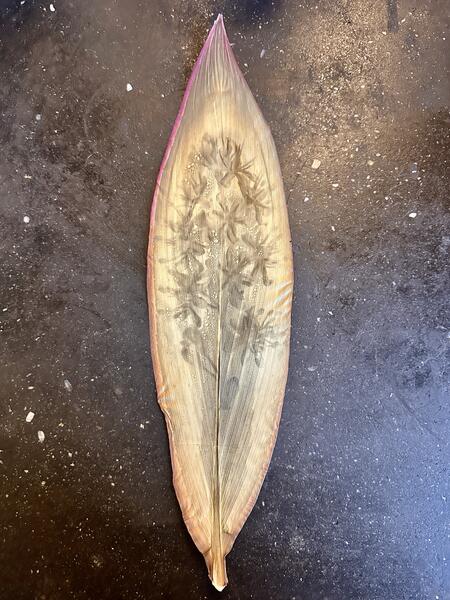 False Asphodel
False AsphodelFalse Asphodel, Chlorophyll Print, appx. 10" x 8" 2025
Chlorophyll prints are a light sensitive alternative photographic process. This is a camera-less, film-less and chemical free process using the light sensitivity of plant chlorophyll. "False Asphodel" utilizes images of threatened or extinct native MD plant species juxtaposed and printed on popular plants found at garden centers across the country. These images are not archival and will continue to develop naturally in U.V. light.
-
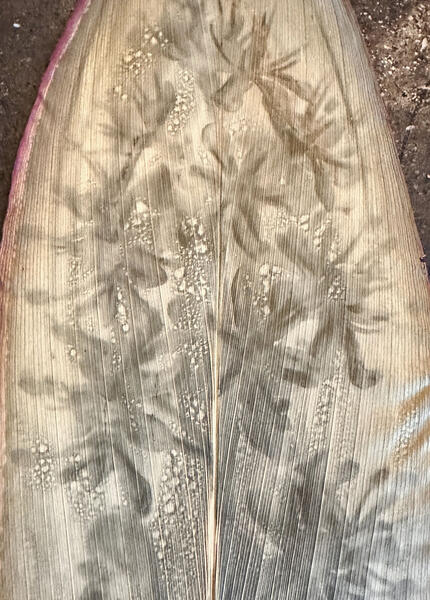 Detail of "False Asphodel"
Detail of "False Asphodel"Detail of False Asphodel, Chlorophyll Print, appx. 10" x 8" 2025.
Chlorophyll prints are a light sensitive alternative photographic process. This is a camera-less, film-less and chemical free process using the light sensitivity of plant chlorophyll. Detail of "False Asphodel" utilizes images of threatened or extinct native MD plant species juxtaposed and printed on popular plants found at garden centers across the country. These images are not archival and will continue to develop naturally in U.V. light.
-
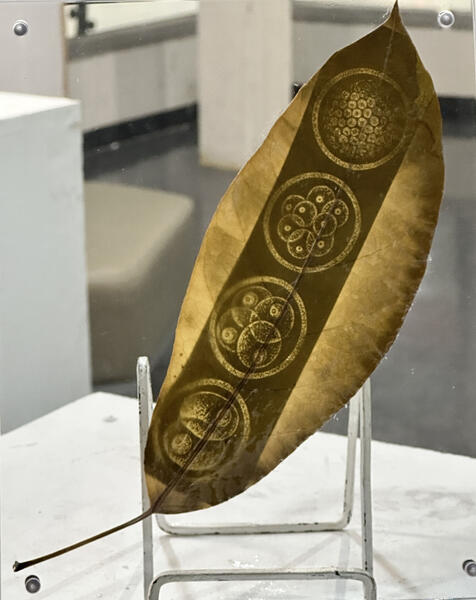 Mitosis
MitosisMitosis, Chlorophyll Print, appx. 10" x 8" 2023
Image of cell division contact printed onto an Umbrella Tree leaf. Chlorophyll printing is an alternative photographic process using plant materials, family photographs, found objects, digitally created negatives, and sun light. Exploring the ephemeral nature of memory. More current pieces utilize images of threatened or extinct native MD plant species juxtaposed and printed on popular plants found at garden centers across the country. This a camera-less, film-less and chemical free process using the light sensitivity in plant chlorophyll. These images are not archival and will continue to develop naturally in U.V. light.
-
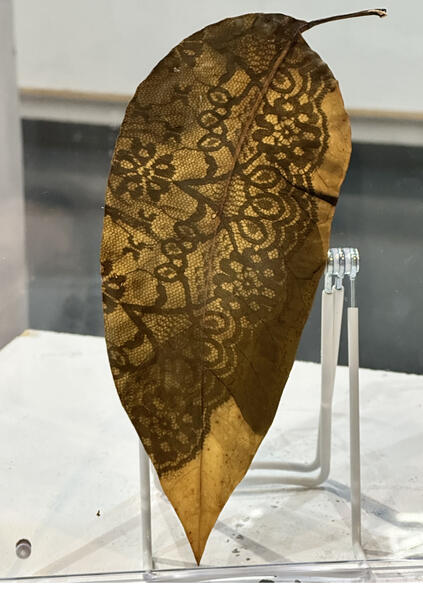 Lace
LaceLace, Chlorophyll Print, appx. 10" x 8" 2023.
My Grandmother's lace contact printed onto an Umbrella Tree leaf. Organic Material, leaf, sunlight. Chlorophyll printing is an alternative photographic process using plant materials, family photographs, found objects, digitally created negatives, and sun light. Exploring the ephemeral nature of memory. More current pieces utilize images of threatened or extinct native MD plant species juxtaposed and printed on popular plants found at garden centers across the country. This a camera-less, film-less and chemical free process using the light sensitivity in plant chlorophyll. These images are not archival and will continue to develop naturally in U.V. light.
-
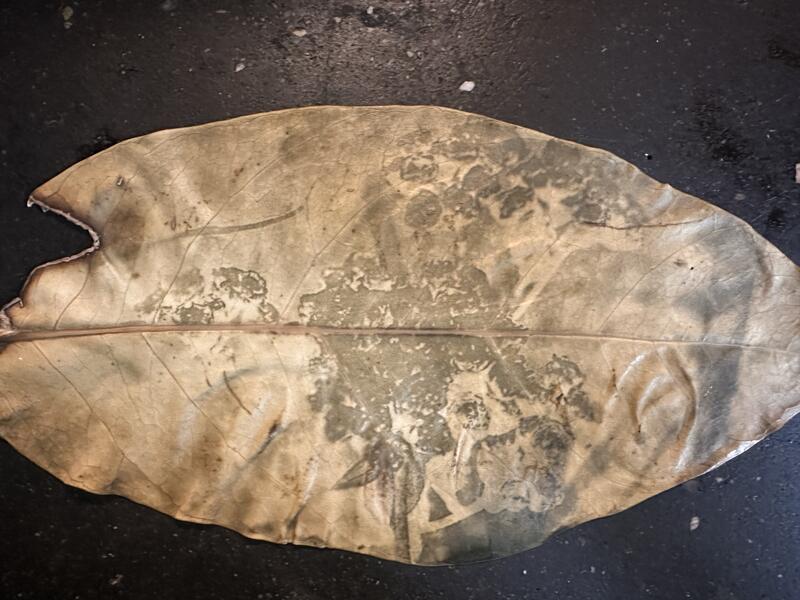 Southern Mountain Mint
Southern Mountain MintSouthern Mountain Mint, Chlorophyll Print, appx. 10" x 8" 2024
Chlorophyll prints are a light sensitive alternative photographic process. This is a camera-less, film-less and chemical free process using the light sensitivity of plant chlorophyll. "Southern Mountain Mint" utilizes images of threatened or extinct native MD plant species juxtaposed and printed on popular plants found at garden centers across the country. These images are not archival and will continue to develop naturally in U.V. light.
-
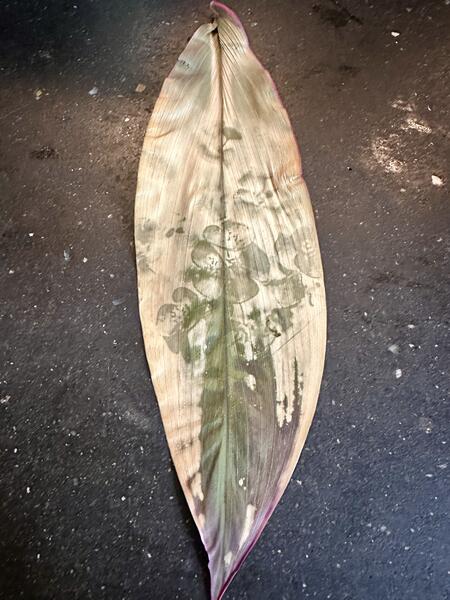 Glade Spurge
Glade SpurgeGlade Spurge, Chlorophyll Print, appx. 10" x 8" 2024
Chlorophyll prints are a light sensitive alternative photographic process. This is a camera-less, film-less and chemical free process using the light sensitivity of plant chlorophyll. "Glade Spurge" utilizes images of threatened or extinct native MD plant species juxtaposed and printed on popular plants found at garden centers across the country. These images are not archival and will continue to develop naturally in U.V. light.
Botanicus
Working with historical alternative processes such as lumen printing, cyanotypes, and anthotypes, further examines the relationship of photographic images with time and impermanence. The first 4 images in this series are Lumen prints, created with expired black and white photographic paper. The prints cannot be fixed with traditional darkroom chemistry, and will continue to develop and change in the ambient light. The color shifts occur with the age of the paper, exposure and temperature. The last two images are cyanotypes with other pigments applied in areas. Cyanotypes are a historic alternative light sensitive process where the liquid cyanotype chemical is applied in layers to a surface. The image is created by laying objects, translucent images, or negatives to block or expose certain areas of the composition. The piece is exposed to UV light and developed in water. The additional colors in these pieces were created by applying different herbs, soaps and salt water during the exposure process. All of these images are created by contact printing with an object, usually a plant in this body of work, leaving a trace or shadow where the light cannot reach. Often these images take many hours of exposure and building up of layers. No two images can be directly replicated due to their ephemeral nature.
-
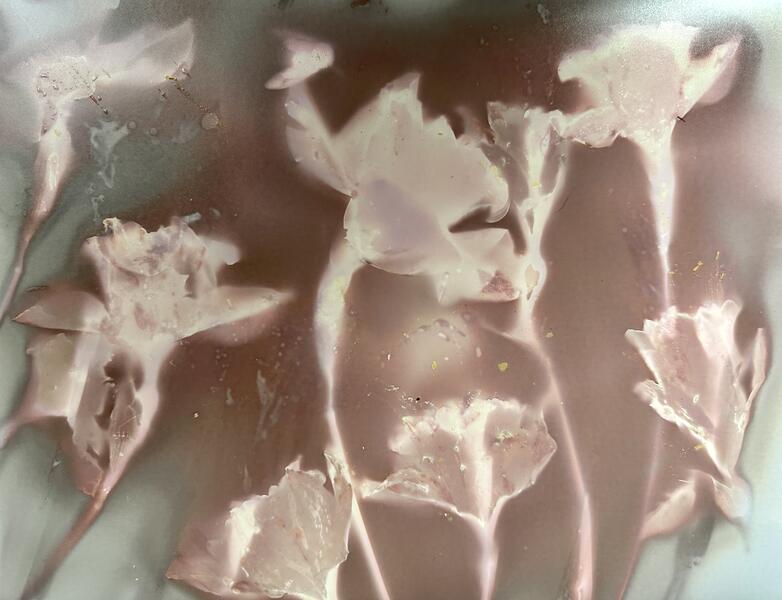 Jonquils
JonquilsJonquils, Lumen Print, 8"x10" 2023
Expired photographic paper, daffodils, u.v. light, contact printed. Lumen prints are created with expired black and white light sensitive photographic paper. The colors appear according to the length of exposure, age of the paper, temperature, and acids in the objects. The prints cannot be fixed with traditional darkroom chemistry, and will continue to develop and change in the ambient light.
-
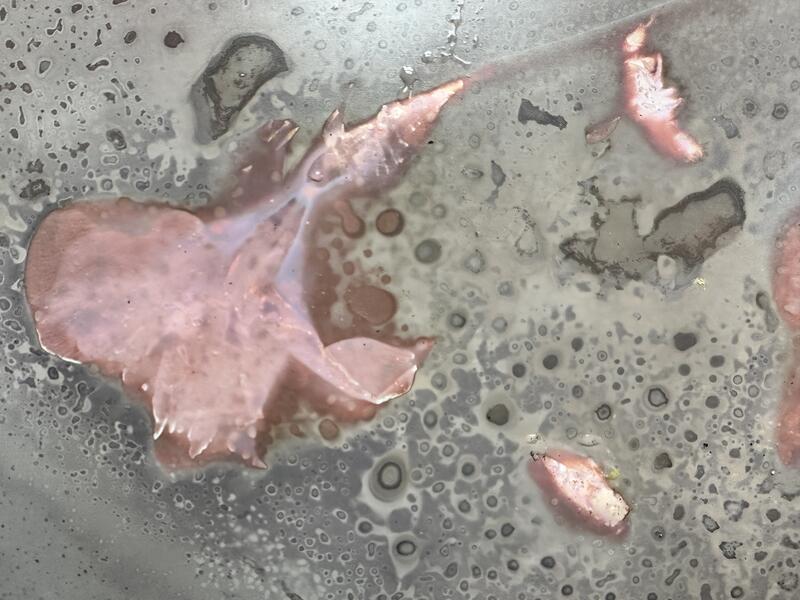 Pollinator
PollinatorPollinators, Lumen Print, 10"x8" 2023
Expired photographic paper, daffodils, bees, u.v. light, contact printed. Lumen prints are created with expired black and white light sensitive photographic paper. The colors appear according to the length of exposure, age of the paper, temperature, and acids in the objects. The prints cannot be fixed with traditional darkroom chemistry, and will continue to develop and change in the ambient light.
-
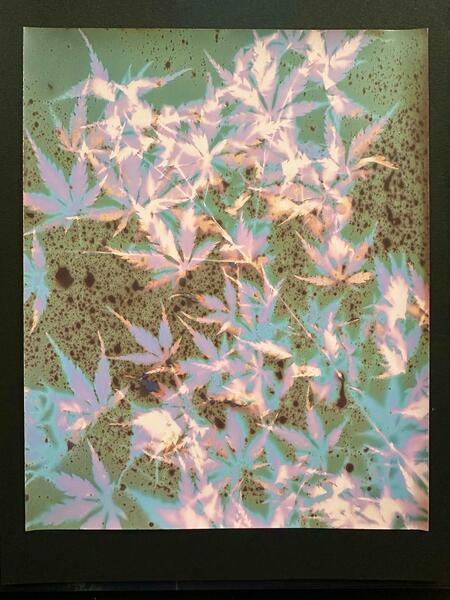 Maples
MaplesMaples, Lumen Print, 10"x 8" 2023
Expired photographic paper, maple branches, u.v. light, contact printed. Lumen prints are created with expired black and white light sensitive photographic paper. The colors appear according to the length of exposure, age of the paper, temperature, and acids in the objects. The prints cannot be fixed with traditional darkroom chemistry, and will continue to develop and change in the ambient light.
-
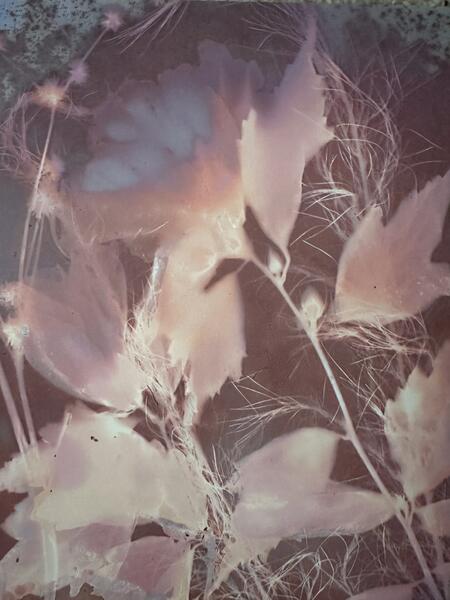 Hibiscus
HibiscusHibiscus, Lumen Print, 10"x8" 2023
Expired photographic paper, hibiscus, salt marsh plants, and u.v. light, contact printed. Lumen prints are created with expired black and white light sensitive photographic paper. The colors appear according to the length of exposure, age of the paper, temperature, and acids in the objects. The prints cannot be fixed with traditional darkroom chemistry, and will continue to develop and change in the ambient light.
-
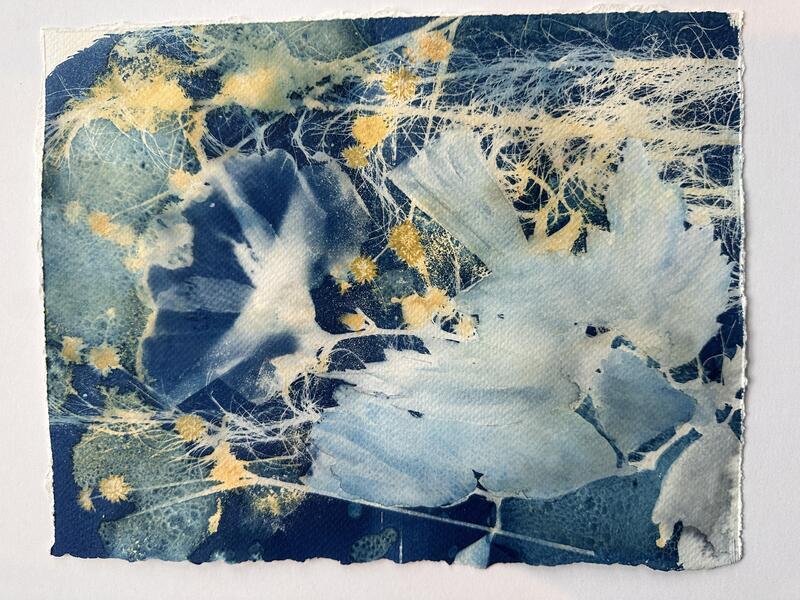 Salt Marsh
Salt MarshSalt Marsh, Cyanotype Collage, appx. 10"x8" 2023
Cyanotype collage on watercolor paper with found plants and objects, seaweed, salt water, vinegar, soap bubbles, sunlight and turmeric applied during exposure in sunlight.
-
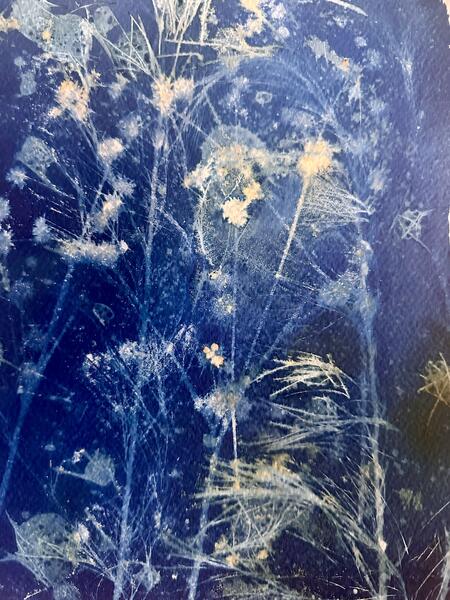 Salt Grass
Salt GrassSalt Grass, Cyanotype Collage, appx. 10"x8" 2023
Cyanotype collage on watercolor paper with found plants and objects, seaweed, salt water, vinegar, soap bubbles, sunlight and turmeric applied during exposure in sunlight.
-
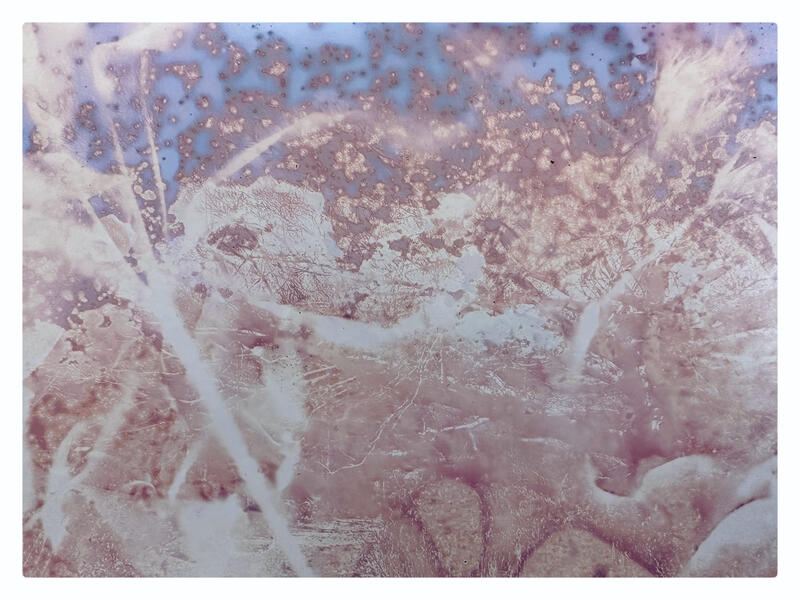 Leftovers
LeftoversLeftovers, Lumen Print, 8"x10" 2024
Expired photographic paper, wilted flower bouquet, and u.v. light, contact printed. Lumen prints are created with expired black and white light sensitive photographic paper. The colors appear according to the length of exposure, age of the paper, temperature, and acids in the objects. The prints cannot be fixed with traditional darkroom chemistry, and will continue to develop and change in the ambient light.
-
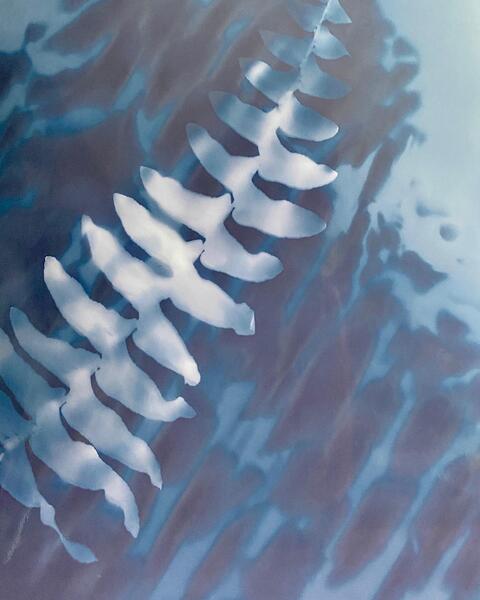 Ferns
FernsFerns, Lumen Print, 7"x5" 2023
Expired photographic paper, fern, u.v. light, and contact printed. Lumen prints are created with expired black and white light sensitive photographic paper. The colors appear according to the length of exposure, age of the paper, temperature, and acids in the objects. The prints cannot be fixed with traditional darkroom chemistry, and will continue to develop and change in the ambient light.
-
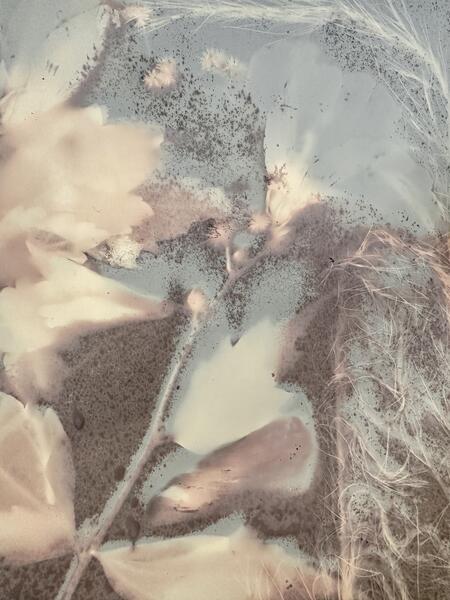 Rose of Sharon
Rose of SharonRose of Sharon, Lumen Print, 10"x8" 2023
Expired photographic paper, Rose of Sharon, marsh plants, salt water, u.v. light, and contact printed. Lumen prints are created with expired black and white light sensitive photographic paper. The colors appear according to the length of exposure, age of the paper, temperature, and acids in the objects. The prints cannot be fixed with traditional darkroom chemistry, and will continue to develop and change in the ambient light.
Printed on expired black and white Agfa paper, 2023.
-
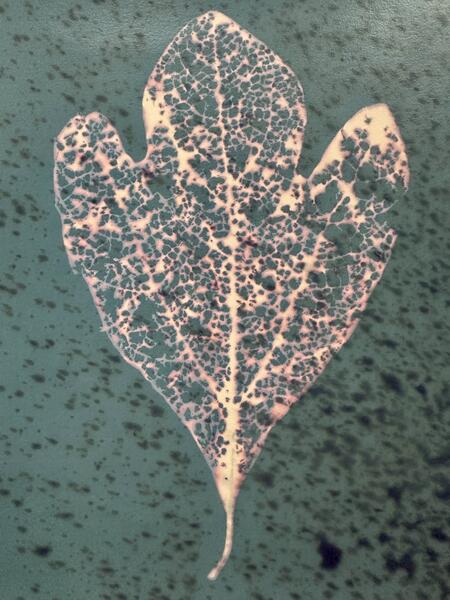 Skeleton Leaf
Skeleton LeafSkeleton Leaf Lumen print, appx. 5"x7" 2023
Created with expired black and white photographic paper. The prints cannot be fixed with traditional darkroom chemistry, and will continue to develop and change in the ambient light. The color shifts occur with the age of the paper, exposure, temperature and the acids in the objects. 5" x 7" 2023.
Ebb Series
My work with historical alternative processes such as lumen printing and anthotypes, further examines the relationship of photographic images with time and impermanence. The prints cannot be fixed with traditional darkroom chemistry, which is decidedly not environmentally friendly, and will fade away in ambient light. In the Ebb project, I collect seaweed, plant material, and found objects from the areas near ghost forests. I contact print onto photographic paper leaving the translucent silhouettes, and attempt to stabilize the images with saltwater. Here salt water is an agent of preservation rather than destruction.
-
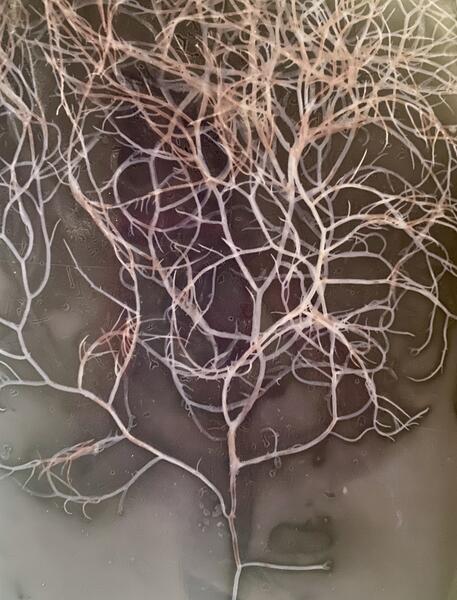 Ebb
EbbEbb Series, Lumen Print, 10"x8" 2023
Expired photographic paper, seaweed u.v. light, contact printed, stabilized in salt water. Lumen prints are created with expired black and white light sensitive photographic paper. The colors appear according to the length of exposure, age of the paper, temperature, and acids in the objects. The prints cannot be fixed with traditional darkroom chemistry, and will continue to develop and change in the ambient light.
-
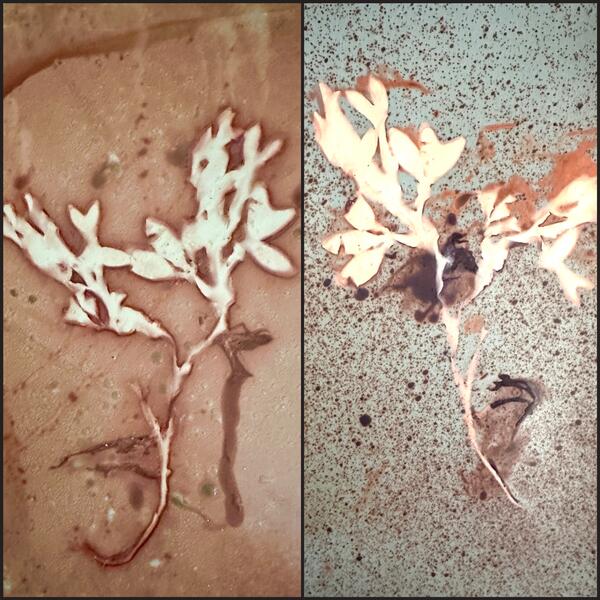 Ebb Series Diptych
Ebb Series DiptychEbb Series Diptych, Lumen Print, 10"x8" 2023
Expired photographic paper, seaweed u.v. light, contact printed, stabilized in salt water. Lumen prints are created with expired black and white light sensitive photographic paper. The colors appear according to the length of exposure, age of the paper, temperature, and acids in the objects. The prints cannot be fixed with traditional darkroom chemistry, and will continue to develop and change in the ambient light.
-
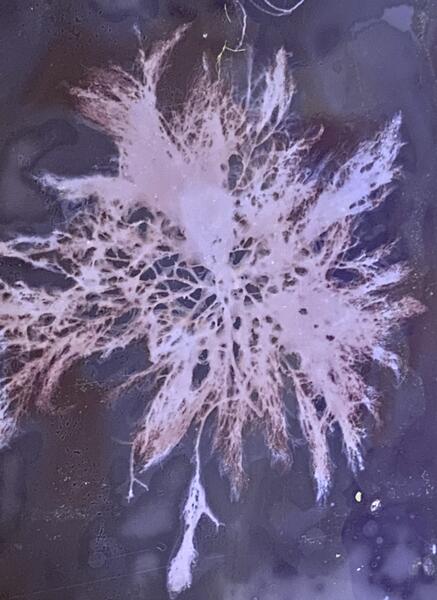 Ebb Series
Ebb SeriesEbb Series, Lumen Print, 10"x8" 2023
Expired photographic paper, seaweed u.v. light, contact printed, stabilized in salt water. Lumen prints are created with expired black and white light sensitive photographic paper. The colors appear according to the length of exposure, age of the paper, temperature, and acids in the objects. The prints cannot be fixed with traditional darkroom chemistry, and will continue to develop and change in the ambient light.
-
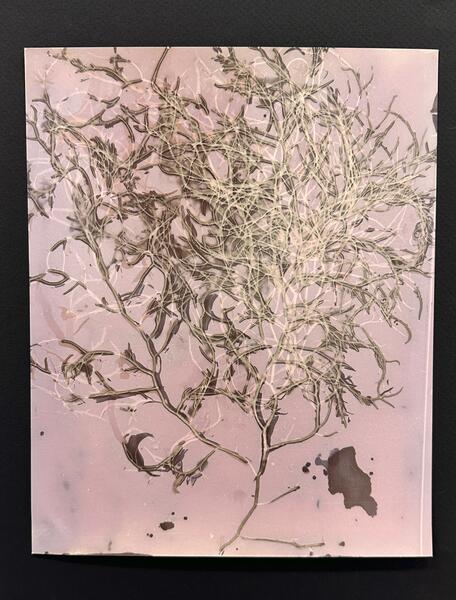 Ebb Series
Ebb SeriesEbb Series, Lumen Print, 10"x8" 2023
Expired photographic paper, seaweed u.v. light, contact printed, stabilized in salt water. Lumen prints are created with expired black and white light sensitive photographic paper. The colors appear according to the length of exposure, age of the paper, temperature, and acids in the objects. The prints cannot be fixed with traditional darkroom chemistry, and will continue to develop and change in the ambient light.
-
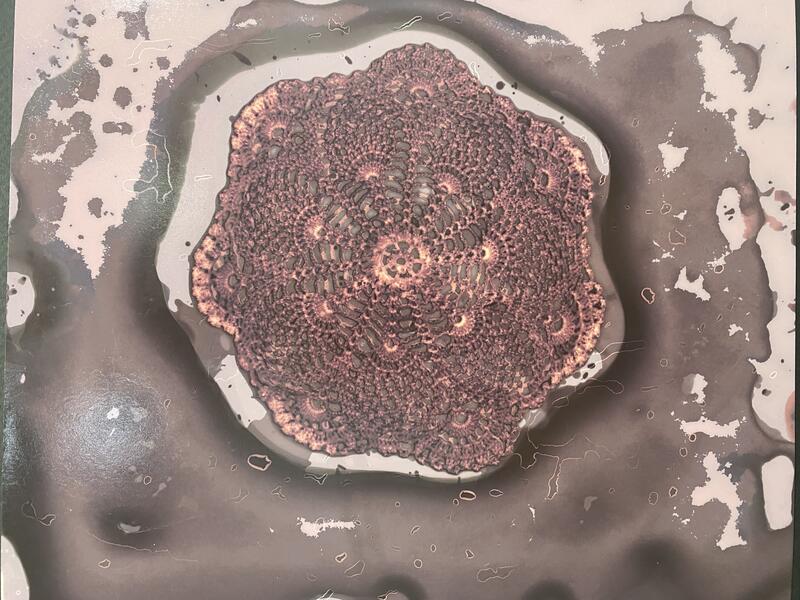 Lace
LaceLace, Lumen Print, 10"x8" 2023
Expired photographic paper, lace, u.v. light, contact printed, stabilized in salt water. Lumen prints are created with expired black and white light sensitive photographic paper. The colors appear according to the length of exposure, age of the paper, temperature, and acids in the objects. The prints cannot be fixed with traditional darkroom chemistry, and will continue to develop and change in the ambient light.
-
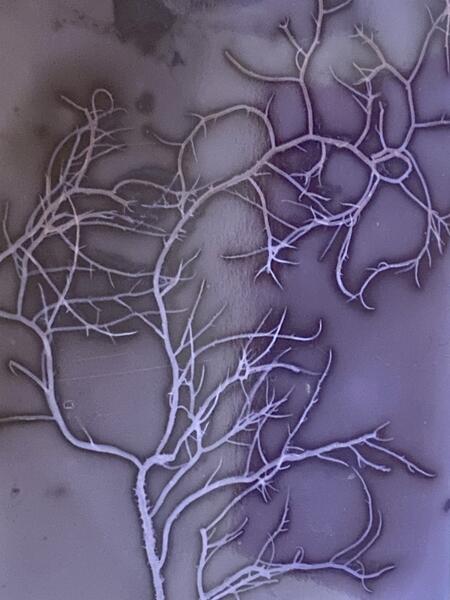 Sea Weed
Sea WeedSeaweed, Lumen Print, 10"x8" 2023
Expired photographic paper, seaweed u.v. light, contact printed, stabilized in salt water. Lumen prints are created with expired black and white light sensitive photographic paper. The colors appear according to the length of exposure, age of the paper, temperature, and acids in the objects. The prints cannot be fixed with traditional darkroom chemistry, and will continue to develop and change in the ambient light.
-
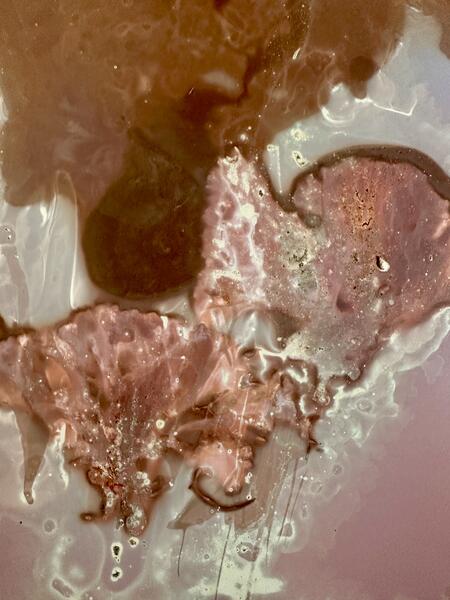 Sea Nettle #3, Lumen Print
Sea Nettle #3, Lumen PrintSea Nettle #3, Lumen Print, 10" x 8" 2024
In the Ebb project, I collect seaweed, plant material, and found objects from the areas near ghost forests. I contact print onto photographic paper leaving the translucent silhouettes, and attempt to stabilize the images with saltwater. Here salt water is an agent of preservation rather than destruction.The colors are created by exposing expired black and white photographic paper to U.V. light. Moisture, heat, the acid of the objects all interact with the papers in unusual and non-replicable ways. "Sea Nettle" was created on expired black and white kentmere paper in 2024, 8" x 10"
-
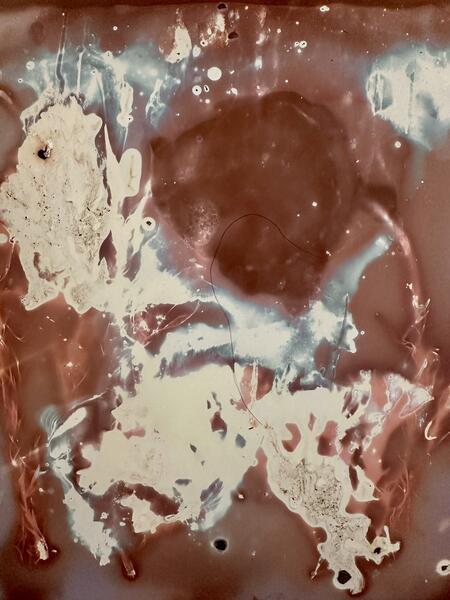 Sea Nettle, Lumen Print
Sea Nettle, Lumen PrintSea Nettle, Lumen Print, 10" x 8" 2024
In the Ebb project, I collect seaweed, plant material, and found objects from the areas near ghost forests. I contact print onto photographic paper leaving the translucent silhouettes, and attempt to stabilize the images with saltwater. Here salt water is an agent of preservation rather than destruction.The colors are created by exposing expired black and white photographic paper to U.V. light. Moisture, heat, the acid of the objects all interact with the papers in unusual and non-replicable ways. "Sea Nettle" was created on expired black and white kentmere paper in 2024, 8" x 10"
-
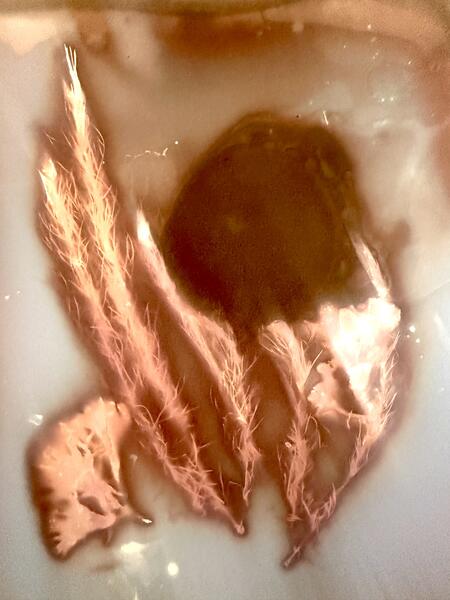 Sea Nettle #2
Sea Nettle #2Sea Nettle #2, Lumen Print, 10" x 8" 2024
In the Ebb project, I collect seaweed, plant material, and found objects from the areas near ghost forests. I contact print onto photographic paper leaving the translucent silhouettes, and attempt to stabilize the images with saltwater. Here salt water is an agent of preservation rather than destruction.The colors are created by exposing expired black and white photographic paper to U.V. light. Moisture, heat, the acid of the objects all interact with the papers in unusual and non-replicable ways. "Sea Nettle" was created on expired black and white kentmere paper in 2024, 8" x 10"
-
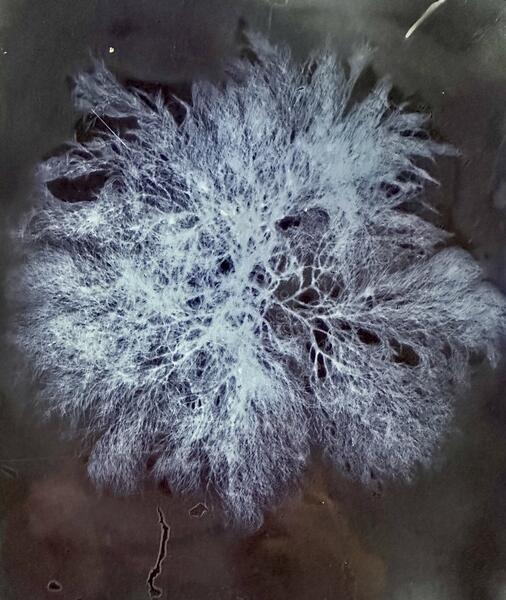 Ebb Series
Ebb SeriesEbb Series, Lumen Print, 10" x 8" 2022
In the Ebb project, I collect seaweed, plant material, and found objects from the areas near ghost forests. I contact print onto photographic paper leaving the translucent silhouettes, and attempt to stabilize the images with saltwater. Here salt water is an agent of preservation rather than destruction.The colors are created by exposing expired black and white photographic paper to U.V. light. Moisture, heat, the acid of the objects all interact with the papers in unusual and non-replicable ways.
Threshold Series
"Threshold" is a photographic project documenting the atmospheric phenomenom of a temperature inversion over the ocean or other large body of water. The horizon line becomes obscured, resulting in a a temporary state of feeling unmoored. This is a liminal space, neither completely land or sea, air or water. It is an absence of footing, and a feeling of disorientation.
-
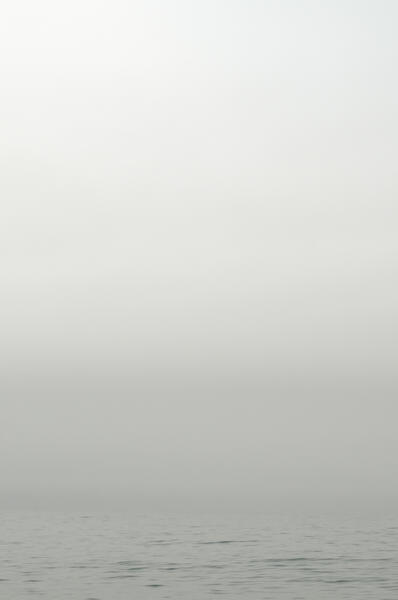 Threshold Series
Threshold SeriesThreshold Series, Digital Photography, Giclée Print appx. 24" x 37" 2023
Threshold is a photographic project documenting the atmospheric phenomenom of a temperature inversion over the ocean or other large body of water. The horizon line becomes obscured, resulting in a a temporary state of feeling unmoored. This is a liminal space, neither completely land or sea, air or water. It is an absence of footing, and a feeling of disorientation.
-
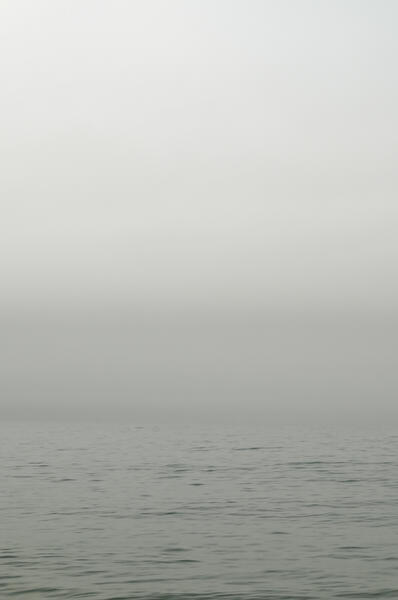 Threshold Series
Threshold SeriesThreshold Series, Digital Photography, Giclée Print appx. 24" x 37" 2023
Threshold is a photographic project documenting the atmospheric phenomenom of a temperature inversion over the ocean or other large body of water. The horizon line becomes obscured, resulting in a a temporary state of feeling unmoored. This is a liminal space, neither completely land or sea, air or water. It is an absence of footing, and a feeling of disorientation.
-
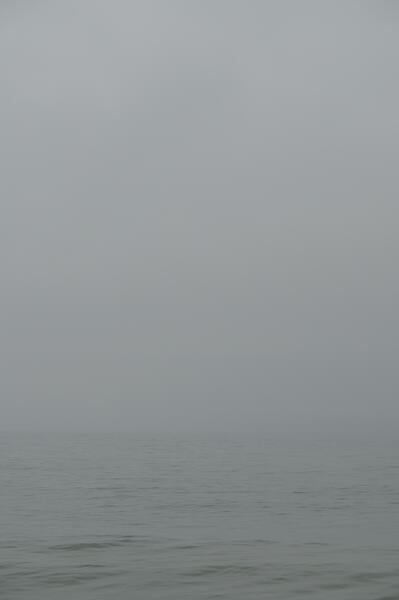 Threshold Series
Threshold SeriesThreshold Series, Digital Photography, Giclée Print appx. 24" x 37" 2023
Threshold is a photographic project documenting the atmospheric phenomenom of a temperature inversion over the ocean or other large body of water. The horizon line becomes obscured, resulting in a a temporary state of feeling unmoored. This is a liminal space, neither completely land or sea, air or water. It is an absence of footing, and a feeling of disorientation.
-
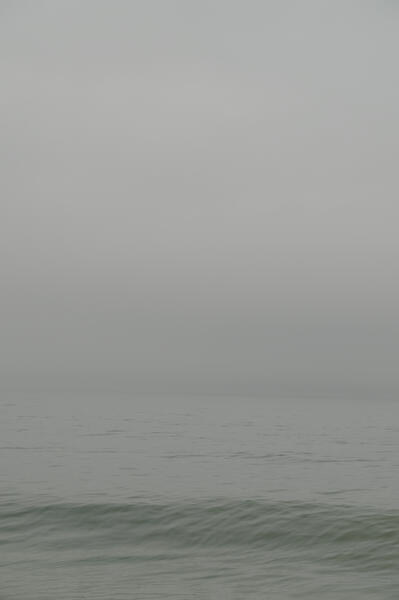 Threshold Series
Threshold SeriesThreshold Series, Digital Photography, Giclée Print appx. 24" x 37" 2023
Threshold is a photographic project documenting the atmospheric phenomenom of a temperature inversion over the ocean or other large body of water. The horizon line becomes obscured, resulting in a a temporary state of feeling unmoored. This is a liminal space, neither completely land or sea, air or water. It is an absence of footing, and a feeling of disorientation.
-
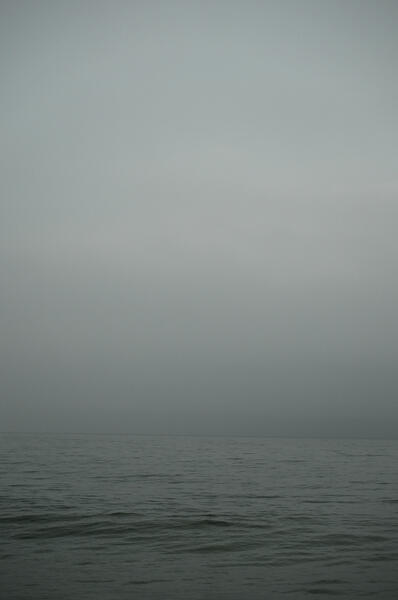 Threshold Series
Threshold SeriesThreshold Series, Digital Photography, Giclée Print appx. 24" x 37" 2023
Threshold is a photographic project documenting the atmospheric phenomenom of a temperature inversion over the ocean or other large body of water. The horizon line becomes obscured, resulting in a a temporary state of feeling unmoored. This is a liminal space, neither completely land or sea, air or water. It is an absence of footing, and a feeling of disorientation.
-
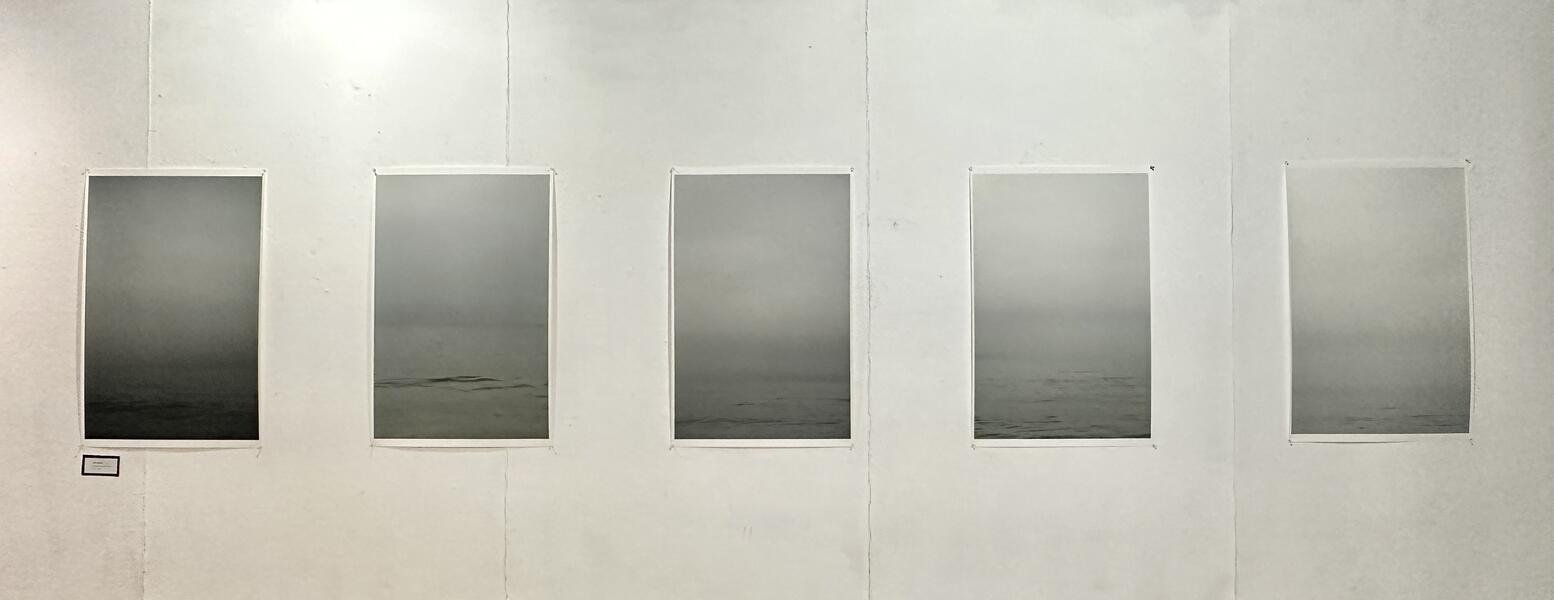 Threshold Installation Image
Threshold Installation ImageThreshold Series, Digital Photography, 5 Giclée Prints appx. 24" x 37" each. Installation image 2023.
Threshold is a photographic project documenting the atmospheric phenomena of a temperature inversion over the ocean or other large body of water. The horizon line becomes obscured, resulting in a a temporary state of feeling unmoored. This is a liminal space, neither completely land or sea, air or water. It is an absence of footing, and a feeling of disorientation.
Digital photography series. Each print is appx 24” x 37” Installation view of series in gallery exhibit.
Untethered
Collaborative project between Sherry Insley and Mitch Maltese. Untethered is a sound and image installation, revisiting images from Threshold, and replacing the disappearing visual information with sound. Using low frequencies, reverberations and higher pitched tones, the aim is to influence the viewer's sensory response to the images. Projected on a vertically hung screen, the sound and images slowly change and evolve while viewing.
-
Untethered
Untethered Image and Sound Collaboration Projection, sizes vary, 2023
Untethered is a sound and image installation, revisiting images from Threshold, and replacing the disappearing visual information with sound. Using low frequencies, reverberations and higher pitched tones, the aim is to influence the viewer's sensory response to the images. Projected on a vertically hung screen, the sound and images slowly change and evolve while viewing.
-
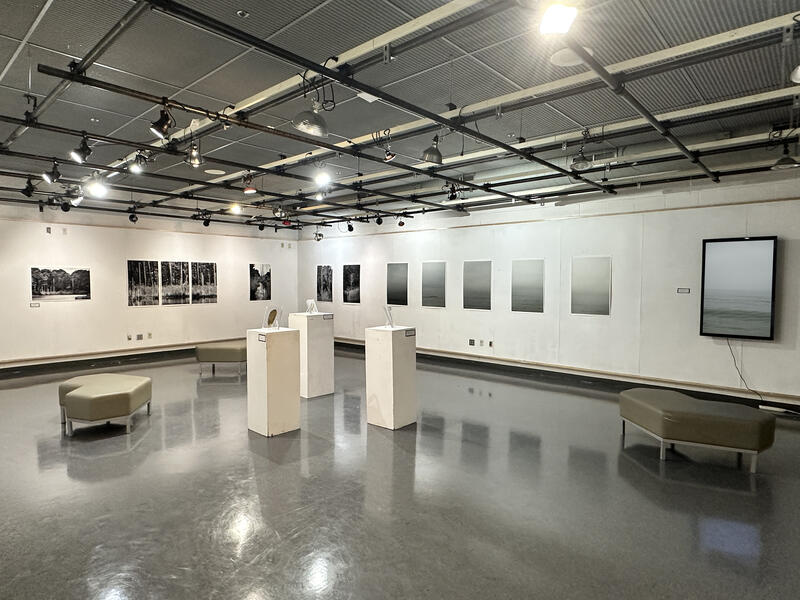 Installation View of Untethered Installation
Installation View of Untethered InstallationUntethered Installation view of video projection in gallery show. Video and sound installation is viewed on a vertically hung screen.
Temporality Series
Photographic series shot at Lake Montebello and surrounding areas. Temperature inversions create layers of dense mist over large bodies of water or open fields. Obscuring the horizon line and landscape. The usually busy environment is muffled and rendered still in these temporarily quiet moments.
-
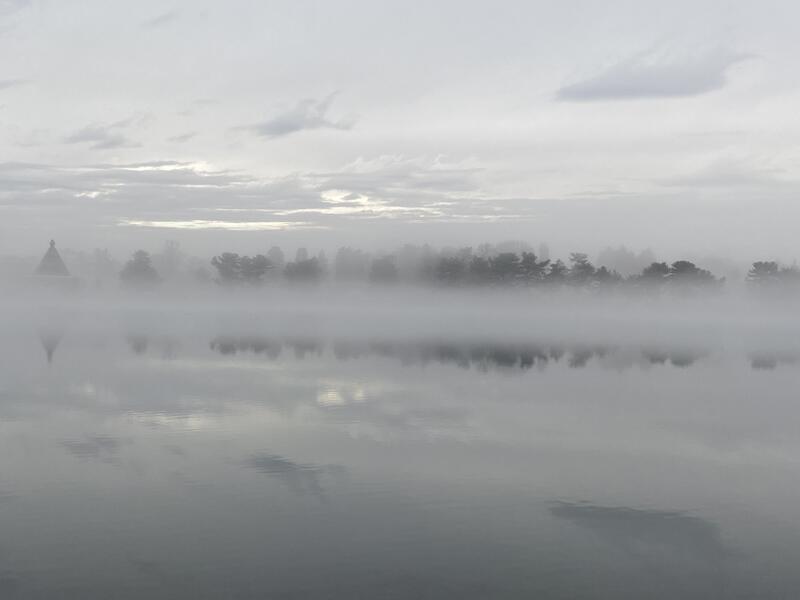 Lake Montebello
Lake MontebelloLake Montebello, Digital Photography, Giclée Print, appx. 20"x24" 2022
Photographic series shot at Lake Montebello and surrounding areas. Temperature inversions create layers of dense mist over large bodies of water or open fields. Obscuring the horizon line and landscape. The usually busy environment is muffled and rendered still in these temporarily quiet moments.
-
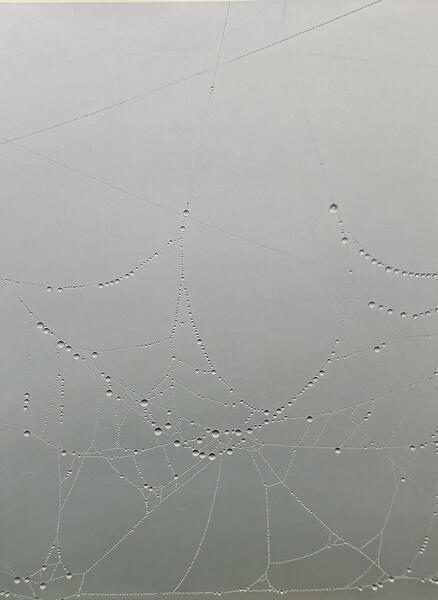 Gems
GemsGems, Digital Photography, Giclée Print, appx. 16"x20" 2022
Photographic series shot at Lake Montebello and surrounding areas. Temperature inversions create layers of dense mist over large bodies of water or open fields. Obscuring the horizon line and landscape. The usually busy environment is muffled and rendered still in these temporarily quiet moments.
-
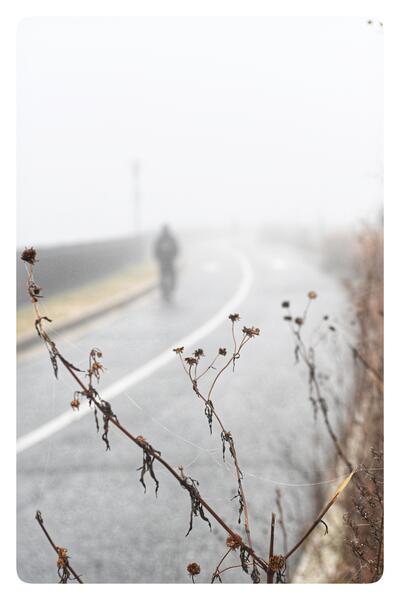 Dog Walker
Dog WalkerDog Walker, Digital Photography, Giclée Print, appx. 16"x20" 2022
Photographic series shot at Lake Montebello and surrounding areas. Temperature inversions create layers of dense mist over large bodies of water or open fields. Obscuring the horizon line and landscape. The usually busy environment is muffled and rendered still in these temporarily quiet moments.
-
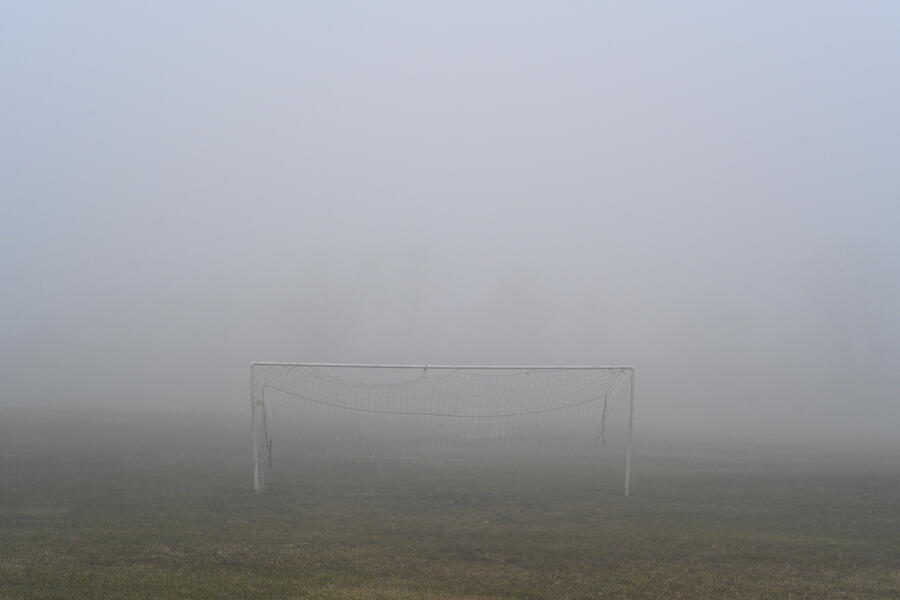 Goals
GoalsGoals, Digital Photography, Giclée Print, appx. 20"x24" 2022
Photographic series shot at Lake Montebello and surrounding areas. Temperature inversions create layers of dense mist over large bodies of water or open fields. Obscuring the horizon line and landscape. The usually busy environment is muffled and rendered still in these temporarily quiet moments.
-
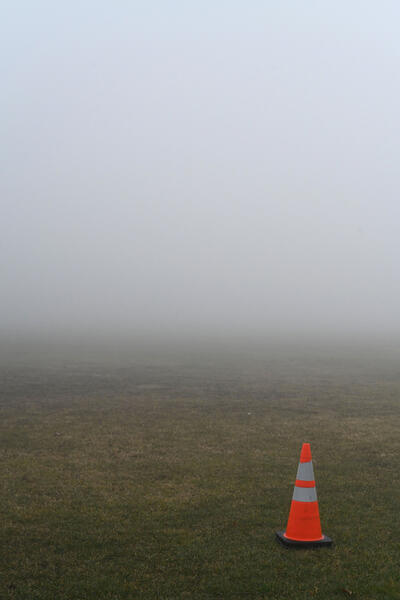 Caution
CautionCaution, Digital Photography, Giclée Print, appx. 20"x24" 2022
Photographic series shot at Lake Montebello and surrounding areas. Temperature inversions create layers of dense mist over large bodies of water or open fields. Obscuring the horizon line and landscape. The usually busy environment is muffled and rendered still in these temporarily quiet moments.
-
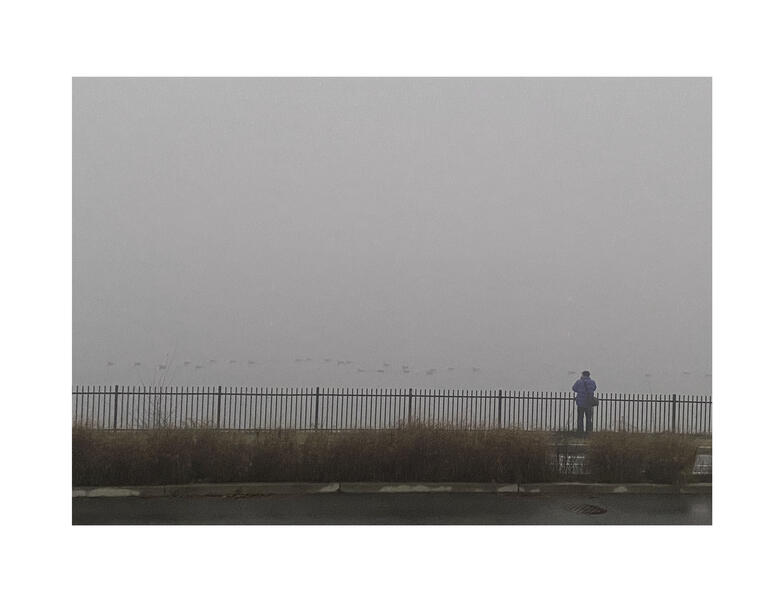 Lake
LakeLake, Digital Photography, Giclée Print, appx. 20"x24" 2022
Photographic series shot at Lake Montebello and surrounding areas. Temperature inversions create layers of dense mist over large bodies of water or open fields. Obscuring the horizon line and landscape. The usually busy environment is muffled and rendered still in these temporarily quiet moments.
